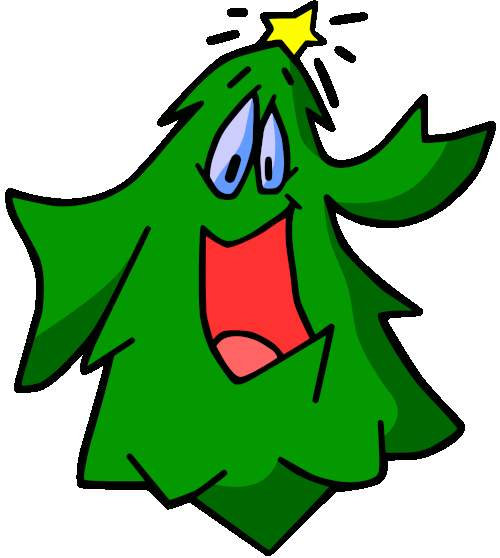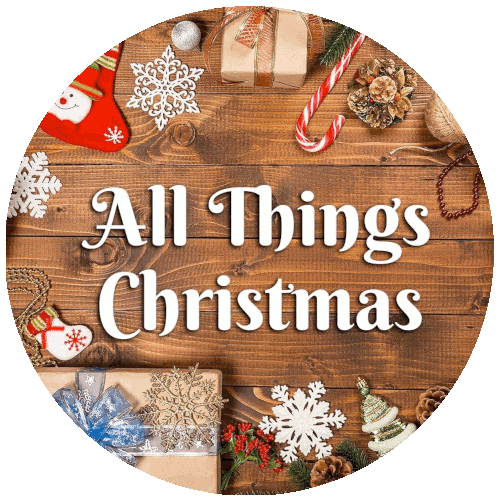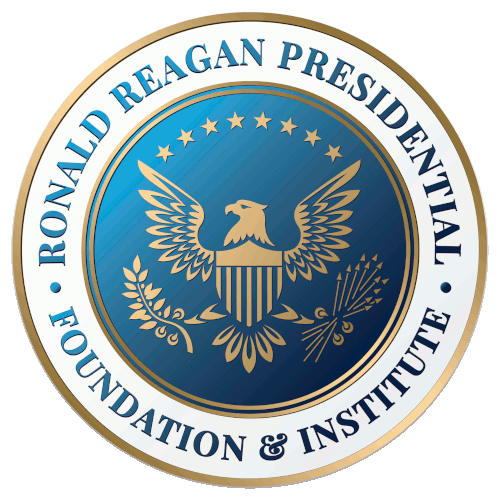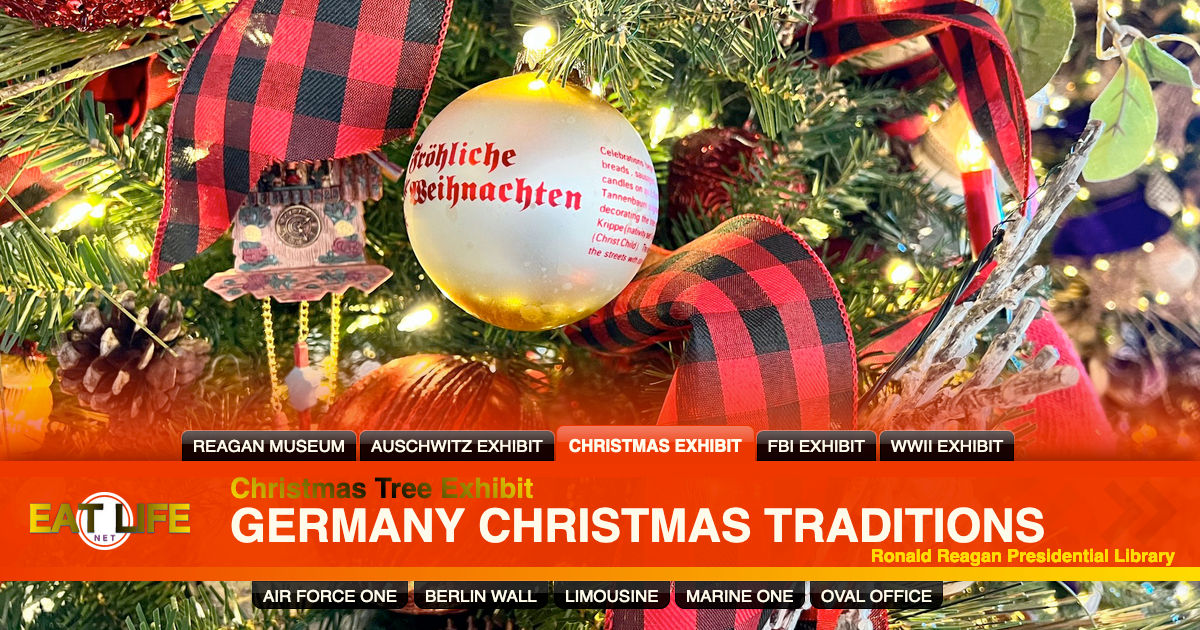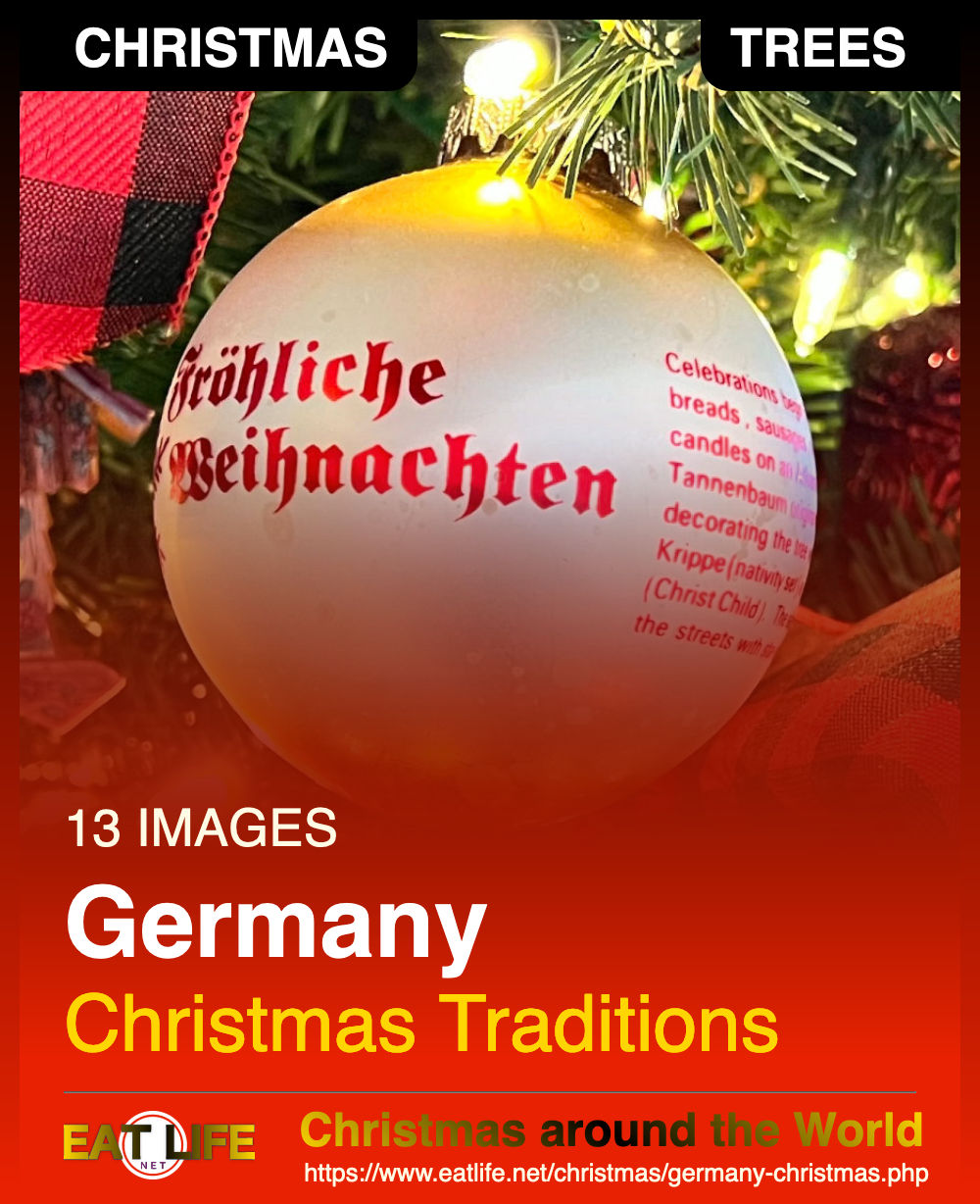GERMAN CHRISTMAS

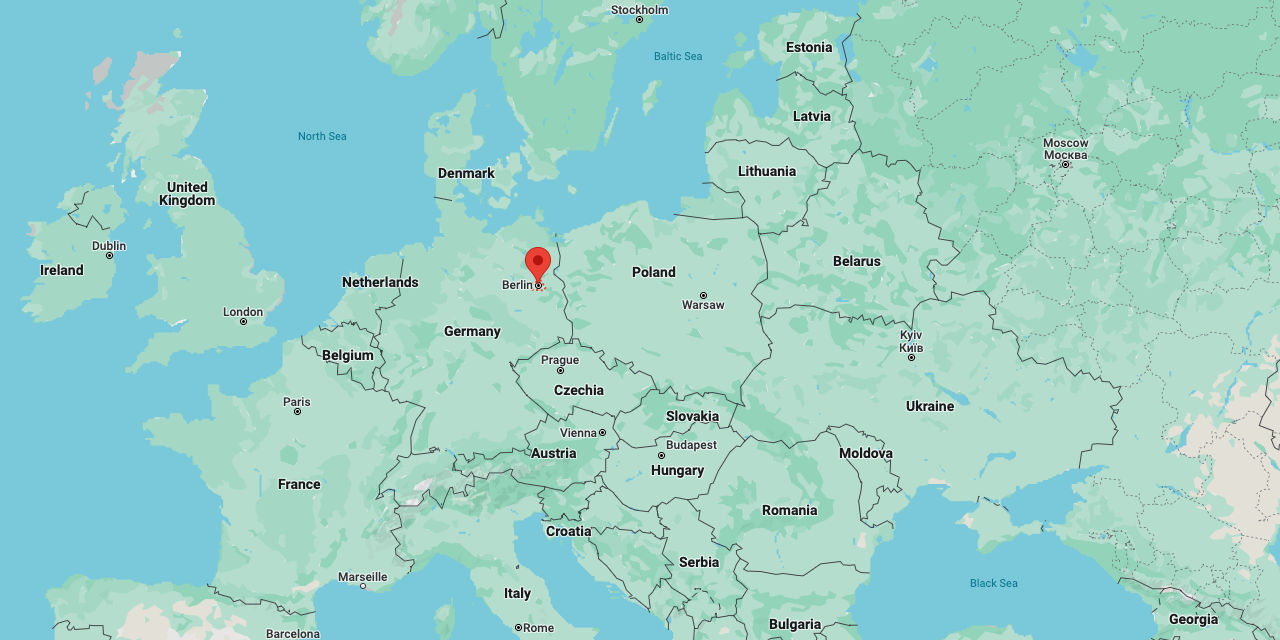
https://www.google.com/maps/place/Berlin,+Germany

| HOW TO SAY MERRY CHRISTMAS: | |
|---|---|
| In German | Frohe Weihnachten |

WHYCHRISTMAS.COMChristmas in Germany
A big part of the Christmas celebrations in Germany is Advent. Several different types of Advent calendars are used in German homes. As well as the traditional one made of card that are used in many countries, there are ones made out of a wreath of Fir tree branches with 24 decorated boxes or bags hanging from it. Each box or bag has a little present in it. Another type is called a 'Advent Kranz' and is a ring of fir branches that has four candles on it. This is like the Advent candles that are sometimes used in Churches. One candle is lit at the beginning of each week in Advent.Christmas Trees are very important in Germany. They were first used in Germany during the late Middle Ages. If there are young children in the house, the trees are usually secretly decorated by the mother of the family. The Christmas tree was traditionally brought into the house on Christmas Eve. In some parts of Germany, during the evening, the family would read the Bible and sing Christmas songs such as O Tannenbaum, Ihr Kinderlein Kommet and Stille Nacht (Slient Night).
Sometimes wooden frames, covered with colored plastic sheets and with electric candles inside, are put in windows to make the house look pretty from the outside. There is also the tradition of Scherenschnitte (paper cutting) where Christmas shapes like bells and nativity scenes were cut out of paper and then different colored transparent paper was put behind the openings to make them look like stained glass.
- Christmas Eve is the main day when Germans exchange presents with their families.
- In German Happy/Merry Christmas is 'Frohe Weihnachten'. Happy/Merry Christmas in lots more languages.
- Christmas Day is called "Erster Feiertag" ('first celebration') and the 26th December is known as 'Zweiter Feiertag' ('second celebration') and also 'Zweiter Weihnachtsfeiertag'. This is another day off work and is like Boxing Day in the UK and some other countries.
- In some parts of Germany, mainly the south east of the country, children write to the 'das Christkind/Christkindl' asking for presents. The letters to the Christkind are decorated with sugar glued to the envelope to make them sparkly and attractive to look at. Children leave the letters on the windowsill at the beginning of or during Advent.
- Das Christkind translates as 'The Christ Child' in English but Germans don't think of the Christkind as the baby Jesus! The Christkind is often described as a young girl with 'Christ like' qualities. In Nurnberg (Nuremberg) a young girl is chosen every year to participate in a parade as the Christkind. She wears a long white and gold dress, has long blond curly hair and wears a gold crown and sometimes wings like an angel. This is similar to St Lucia is Sweden. (And it can seem a bit confusing calling the 'Christ Child', Jesus, a girl!)
- Santa Claus or Father Christmas (der Weihnachtsmann) brings the main Christmas presents on December 24th. You might also write a letter to Weihnachtsmann in other parts of Germany. Some people say that Santa/Father Christmas (Weihnachtsmann) brings the presents and some say it is Christkind!
- As well as hoping for presents from Christkind or der Weihnachtsmann, some children also hope that 'der Nikolaus' will bring you some small gifts, such as sweets and chocolate on the 6th December (St Nicholas's Day). He comes in the night between the 5th and the 6th and puts the presents into the shoes of children, who usually place them by their doors. He might also knock on the door and the children will have to sing a song, play a song on an instrument or tell a story to St Nicholas before he gives them their presents.
- In some regions of Germany, there is a character called "Knecht Ruprecht" or "Krampus" who accompanies Nikolaus (St. Nicholas) on the 6th of December. He is big horned monster clothed in rags and carries chains. He is meant to punish the children who have been bad! He is usually the one who scares the little children. In other parts of Germany, St. Nicholas is followed by a small person called "Schwarzer Peter" (Black Peter) who carries a small whip. Black Peter also accompanies St. Nicholas or Sinterklaas in The Netherlands. In north west Germany Santa is joined by Belsnickel a man dressed all in fur. Although 'der Nikolaus' visits in December, he's not officially part of Christmas!
- At small work places and school parties, secret presents are often exchanged. Sometimes a door is opened just wide enough for small presents to be thrown into the room. The presents are then passed around among the people until each person has the correct present! It is thought to be bad luck to find out who sent each present.
- Secret Santa might also be known as 'Wichtel' (a small Christmas gnome/elf) where you give sometime a small gift or do something nice for them.

Culture TripChristmas In Germany
Every culture has its own unique holiday traditions, and Germany's have been influential in shaping Christmas customs worldwide. In fact, we would wager that you may even recognize a few, while others might seem altogether outlandish. Here's how to celebrate Christmas in Deutschland.Visit a Weihnachtsmarkt
No doubt, whether we're talking about natives, expats, or tourists, anyone who is in Germany during Christmas Market season should visit one, as this is an excellent way to inject a solid dose of genuine Christmas cheer into the holiday hustle and bustle. There are countless markets located throughout Germany, with several typically going down in every major city. Probably some of the most popular are the ones occurring in Nuremberg, Rothenburg ob der Tauber, and Munich. Come here to enjoy a pleasant and cozy atmosphere where vendors sell their artisan wares and a myriad of tasty treats. The Weihnachtsmarkt experience is best enjoyed with friends, but because the mood is so good, it won't be hard to make new ones there.Get an Advent Calendar
Historically, Germany is a pretty religious country. As is the case in many cultures, much of the Yuletide traditions have been secularized. Therefore, all you really need to know nowadays is that the 'Adventskalender' (Advent calendar) tracks the four weeks leading up to Christmas, where each day of the countdown is marked with a little prize hidden within the depths of the colorful 3D calendar. Typically, these calendars are quite cheap and come filled with small Christmas-themed chocolates, but they can also be quite extravagant with chocolate manufacturers like Godiva producing their own versions.Gather around the Tannenbaum for some gemutlichkeit
Okay, so this is a multifaceted suggestion. Let us take a moment to break it down. Germans have long engaged in the custom of incorporating an evergreen tree into the Christmas decor schemes of their living rooms. Known in Deutsch as a Tennenbaum, it is not uncommon, even today, for families and friends to gather around the tree and sing the eponymous hymn. Doing so is a fantastic way to conjure feelings of gemutlichkeit, a distinct German word that roughly translates to mean a state of coziness and good cheers, quite similar to the Danish term, hygge.Eat the part
Christmas is typically viewed as a time of splendor and indulgence, and Germans do not exempt themselves from this trend. Traditional German foods are generally quite heavy, and Christmassy variations include apple stuffing, a bounty of the usual dumplings, a succulent roast, often a turkey, goose, or rabbit, along with desserts and drinks.Gluhwein, a kind of spiced mulled wine that is sold virtually everywhere during the holiday season, is probably the best known, but for those that like a bit more of a punch to their holiday beverages, feuerzangen bowle, comprised of warmed rum, wine, and spice, is another favorite. For dessert, stollen will undoubtedly give your preconceptions about fruitcakes a run for their money. Meanwhile, the heart shaped lebkuchen gingerbread cookies are common fixtures at Christmas markets and dining tables around the country.
Shoes out for St. Nick
While Santa Claus is obviously one of the most iconic Christmas figures, leave it to the Europeans to commemorate the depth and origins of old Kris Kringle. The customs observed on St. Nicholas Day is often regarded as the source of modern-day Christmas lore about Santa. Each year on December 5th, the eve of St. Nicholas Day, children leave their shoes outside of their bedroom doors in hopes that he will visit and leave the shoes filled with treats in his wake. Of course, only those children who were nice all year-round are lucky enough to have this fortune. Starting to sound familiar?Dabble in Krampuslaufe
We all might be familiar with Santa, but leave it to the Germans to invent a stark and terrifying counterpart for punishing the naughty ones. Krampus, typically believed to have been derived from pagan lore, is a demonic anthropomorphic goat with a forked tongue who is known to run around beating and even eating children who did not behave. All of this has typically been omitted from common Christmas traditions, but in case you were wondering where the whole getting coal for being naughty thing comes from, Krampus is to thank. Today, in southern Germany, Krampuslaufe still go down, where grown men dress in terrifying renditions of the creature and parade through the town. For the fainter of heart, it is also typical to exchange greeting cards with his likeness on them, known as Krampuskarten.Do it all on Christmas Eve
For those looking to celebrate Christmas like the Germans, take note of timing. Most of the Christmas gathering, eating, and gift exchanging will take place on Christmas Eve, known as Heiliger Abend, or 'holy evening.' This is so much the case that just about all offices and businesses will close in the afternoon so that people can make final preparations and get to their Christmas shindigs on time. Christmas and the following day are public holidays, and the momentum of the Heiliger Abend festivities trickle over into the following two days.

Christmas Markets
With the Christmas season in Germany comes the fantastic Christmas markets. Find all the fun gifts, artisan crafts, and sweet treats, like stollen, roasted almonds, or lebkuchen - a gingerbread treat - you crave all in one place. The Christkindlmarkt, in German, are set up throughout the country starting around early December (or in some cases even earlier), offering something for kids and adults alike. Aside from rows and rows of fresh, authentic German treats and beautiful gifts, you'll find Christmas choirs, brass bands, and of course, tons of Christmas spirit.St. Nicholas Day
Christmas celebrations in Germany are a month-long event, with various celebrations and traditions throughout December, leading up to Christmas Day itself. The season officially starts on December 6th on Nikolaustag, or the day of Saint Nicholas. Kids certainly love this fun, unique celebration. The night before Nikolaustag, children leave a boot, or a Nikolausstiefel out beside the front door for St. Nick. During the night, while the little ones sleep, Nikolaus comes to each home to leave sweets inside the boot or shoe. Nikolaus has a long white beard, red and white robes, and a golden staff, with an appearance similar to Santa Claus in the US, but with many religious influences.Advent Season
Leading up to Weihnachten, the German word for Christmas, many German families celebrate the advent season. During this time, families set up an Advent wreath, or Adventskranz on the fourth Sunday before Christmas day. This year's advent season will start on December 2nd, 2018, when families set out the wreath adorned with four candles, one to be lit each Sunday until Christmas Day. Many children also use an Advent calendar, similar to in the United States. On each day during the Advent season, children open the doors on the calendar for a chocolatey treat.A Christmas Tree
Yes, Germans also put up the this classic symbol of Christmas. In fact, Christmas trees in Germany date all the way back to the 17th century, in Strasbourg, in the Alsace region. Originally, the German fir trees were adorned in roses, apples, colored paper, and candies. Tannenbaum, as it's called in German, is usually set up on the afternoon of December 24th, just in time for Christmas day. The most common way to get a Christmas tree, also called Weihnachtsbaum, is by heading straight into the woods to chop down your ideal tree yourself.Christmas Eve
After the tree is set up, families across Germany get ready for Christmas Eve, known as Heiligabend. While in the US, families have an extravagant dinner and exchange gifts on the 25th, however in Germany, this all happens on the 24th. German families sit down for a large dinner, usually serving up some traditional German frankfurters, as well as fish, fondue, and sometimes, raclette. Religious families will go to mass earlier in the day, where children will perform in a krippenspiel, or a nativity play.After church, and after the dinner, families sit down to exchange gifts. Gift-giving is so important, it even has its own name: Bescherung. But don't think you can just go right in and start opening presents. German children must wait until they hear the little bell being rung to tell them that Christkind, baby Christ, or Weihnachtsmann, St. Nicholas, has left the home.
Christmas Day
While not as highly celebrated as Christmas Eve, Christmas Day in Germany is still full of festivities. The family sits down for a Christmas Day meal, typically involving lamb, goose, chicken, fondue, and more delicious dishes.
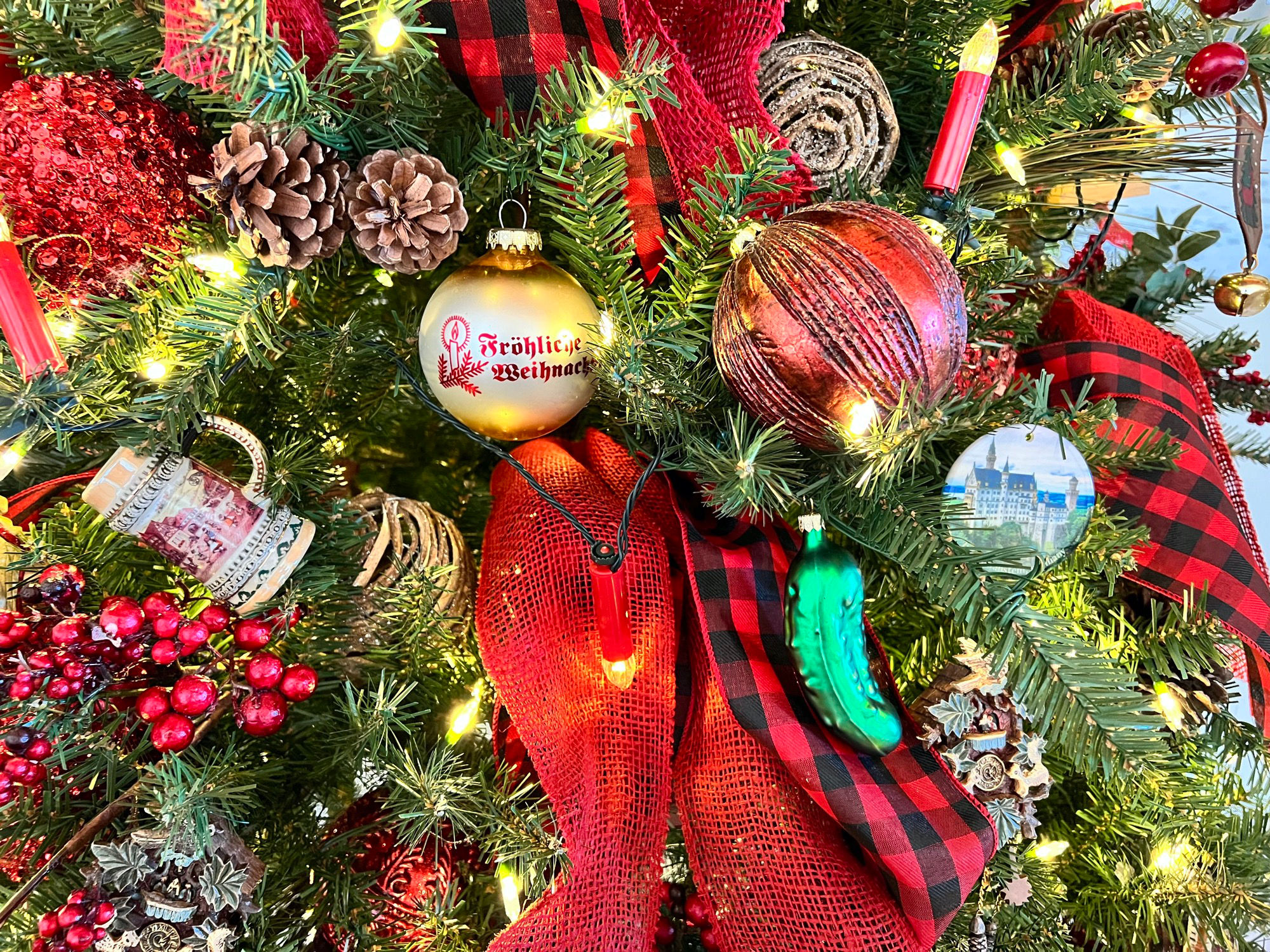
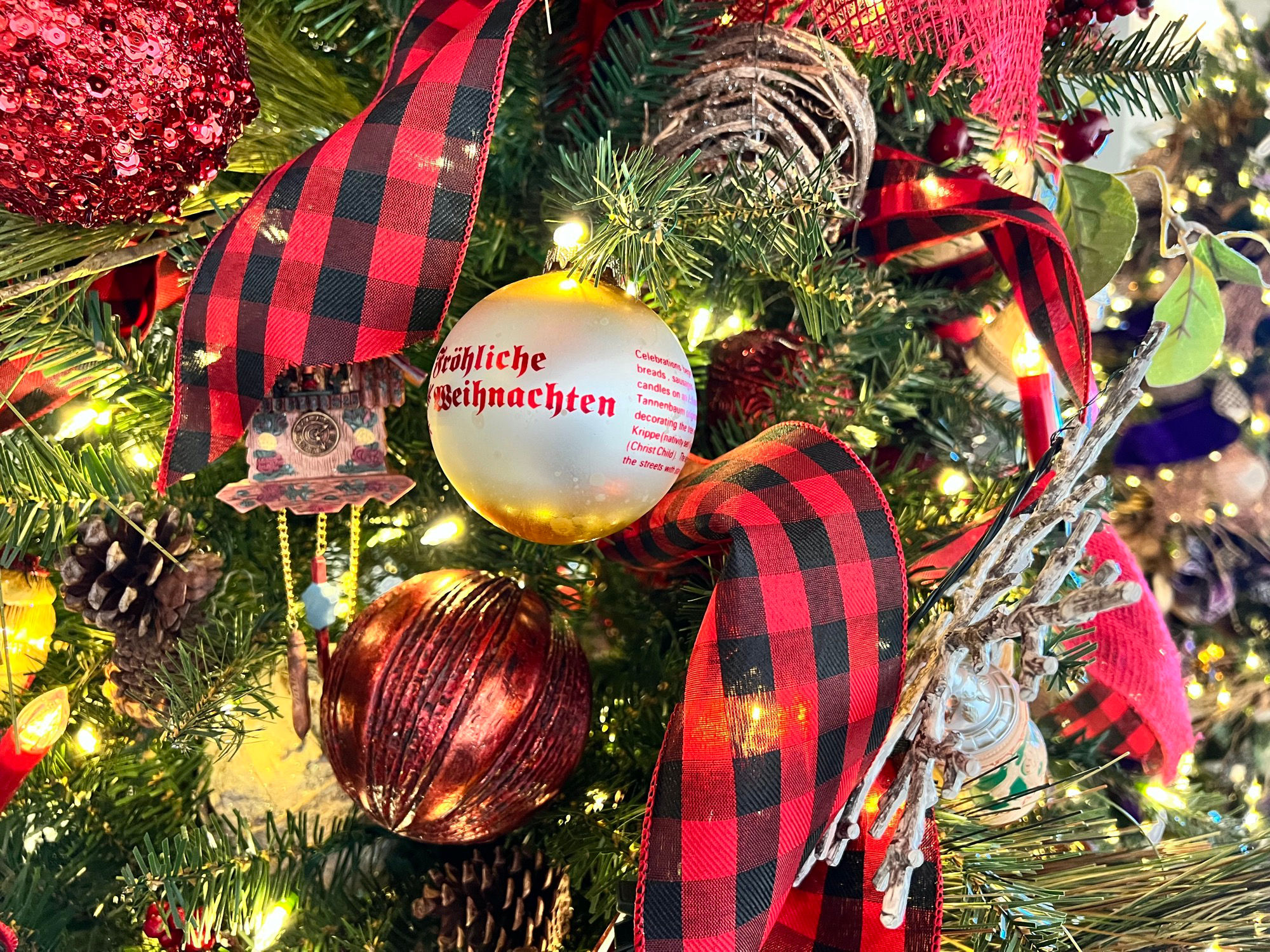
Celebrations begin before December 6 with pageants and fairs featuring cookies, breads, sausages, decorations and toys. Many observe Christ's coming by lighting candles on an Advent wreath or opening Advent calendar windows. Decorating the Tannenbaum originated in Germany. On Heiligabend (Christmas Eve) families enjoy decorating the tree with white candles and ornaments of wood, foil, and glass. A Krippe (nativity set) is placed under the tree. Children receive gifts from the Christkind (Christ Child). The season ends with Epiphany, when the Sternsänger carol and roam the streets with star-shaped lanterns symbolizing the Wise Men from the East.

WORLD HOLIDAY TRADITIONSFroehliche Weihnachten
According to legend, on Christmas Eve in Germany rivers turn to wine, animals speak to each other, tree blossoms bear fruit, mountains open up to reveal precious gems, and church bells can be heard ringing from the bottom of the sea. Of course, only the pure in heart can witness this Christmas magic. All others must content themselves with traditional German celebrating, of which there is plenty. As a matter of fact, there is so much celebrating that is has to begin on December 6th, St. Nicholas Day.As in many other European countries, on the eve of Dec. 6th children place a shoe or boot by the fireplace. During the night, St. Nicholas, the patron saint of children, hops from house to house carrying a book of sins in which all of the misdeeds of the children are written. If they have been good, he fills the shoe or boot with delicious holiday edibles. If they have not been good, their shoe is filled with twigs.
December 21st, supposedly the shortest day (longest night) of the year, is dubbed St. Thomas Day. In parts of the Sauerland, whoever wakes up late or arrives late to work on that day is issued the title "Thomas Donkey." They are given a cardboard donkey and are the subject of numerous jokes throughout the day. But this gentle abuse ends deliciously with round, iced currant buns called "Thomasplitzchen."
This is all preliminary to the excitement of Christmas Eve. Prior to the evening feast, is the presentation of the tree. The Christmas tree, as we know it, originated in Germany. It has a mysterious magic for the young because they are not allowed to see it until Christmas Eve. While the children are occupied with another room (usually by Father) Mother brings out the Christmas tree and decorates it with apples, candy, nuts, cookies, cars, trains, angels, tinsel, family treasures and candles or lights. The presents are placed under the tree. Somewhere, close to the bright display are laid brilliantly decorated plates for each family member, loaded with fruits, nuts, marzipan, chocolate and biscuits. When all is ready a bell is rung as a signal for the children to enter this Christmas fantasy room. Carols are sung, sometimes sparklers are lit, the Christmas story is read and gifts are opened.
"Dickbauch" means "fat stomach" and is a name given to the Christmas Eve because of the tradition that those who do not eat well on Christmas Eve will be haunted by demons during the night. So the opportunity is given to enjoy dishes such as suckling pig, "reisbrei" (a sweet cinnamon), white sausage, macaroni salad, and many regional dishes.
Christmas Day brings with it a banquet of plump roast goose, "Christstollen" (long loaves of bread bursting with nuts, raisins, citron and dried fruit), "Lebkuchen" (spice bars), marzipan, and "Dresden Stollen" ( a moist, heavy bread filled with fruit).
Of Special Note...
The custom of trimming and lighting a Christmas tree had its origin in pre-Christian Germany, the tree symbolizing the Garden of Eden. It was called the "Paradise Baum," or tree of Paradise. Gradually, the custom of decorating the tree with cookies, fruit and eventually candles evolved. Other countries soon adapted the custom. Charles Dickens called it "The Pretty German Toy."

HOW STUFF WORKSChristmas Traditions in Germany
German families prepare for Christmas throughout cold December. Four Sundays before Christmas, they make an Advent wreath of fir or pine branches with four colored candles. They light a candle on the wreath each Sunday, sing Christmas songs, and eat Christmas cookies. The children count the days until Christmas with an Advent calendar. Each day, they open a little numbered flap on the calendar to see the Christmas picture hidden there.In the weeks leading up to Christmas, homes are filled with the delightful smells of baking loaves of sweet bread, cakes filled with candied fruits, and spicy cookies called lebkuchen.
Bakery windows are filled with displays of lovely marzipan confections in the shape of fruits and animals. Best of all are the famous outdoor Christmas markets. The stalls overflow with all sorts of holiday toys, gifts, decorations, and delicacies.
Many German children write letters to St. Nicholas asking for presents. St. Nicholas Day is December 6. Other German children write their letters to the Christ Child. In some areas, the Christ Child brings gifts to children on St. Nicholas Eve and in other areas on Christmas Eve. He is dressed all in white, with golden wings and a golden crown.
Christmas Eve is the most important time of the Christmas season for families. Some even say it is a magical night when animals can speak. The wonderful tradition of the Christmas tree, which started in Germany, is the heart of the celebration. Grown-ups decorate the evergreen tree with beautiful ornaments of colored glass and carved wood, silver stars, and strings of lights. A golden angel is placed at the very top of the tree.
Under the Christmas tree, the family arranges a manger scene to depict the stable that Jesus was born in. Parents may also pile presents from the Christ Child beneath the Christmas tree's richly decorated boughs. Just after dark, a bell rings, and the excited children run into the room to see the beautiful lighted tree in all its glory. The family members exchange gifts, recite poems, and sing Christmas carols. "Silent Night, Holy Night" is an old German favorite. Then everyone enjoys a Christmas feast of roast goose, turkey, or duck.
In some parts of Germany, families still follow an old tradition. The children leave their shoes outside the front door. These shoes are filled with carrots and hay to feed St. Nicholas' horse as he rides by. If the children were good all year, St. Nicholas leaves apples, nuts, and candy for them.
On Christmas Day the white candle of the Advent wreath is lit. This day is quietly focused on family. They attend church together, and then they eat a delicious Christmas dinner together.
But for the following Twelve Days of Christmas, people in some parts of Germany beat drums to drive off spirits. On Twelfth Night, or Epiphany, on January 6, boys dress up like the Three Kings who visited Baby Jesus in the manger so long ago. They carry a star on a pole and go through the town singing Christmas carols. Then the family puts away its Christmas decorations for another year, until December comes around again.
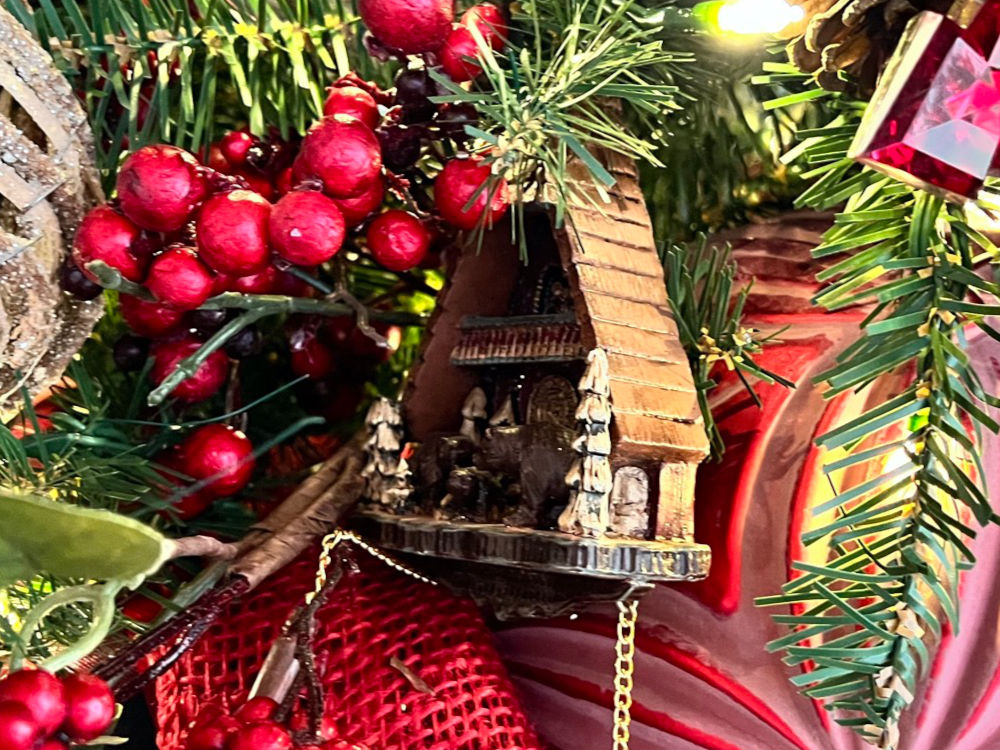
The Surprisingly Sordid History of Germany's Christmas Markets
From their medieval roots and their brush with Nazis, these beloved bazaars are now celebrated around the world.
National GeographicGermany's Christmas Markets
Every holiday season, Christmas markets transform the main squares of cities across Europe into winter wonderlands. Twinkling lights adorn wooden huts and boughs of holly hang from street lamps. Vendors sell hand-carved ornaments and Nativity scene figurines, alongside piping hot mugs of gluhwein (mulled wine), as Christmas carols fill the air. In Germany alone-where the tradition began-there are usually 2,500 to 3,000 holiday markets a year.Historians say preserving this cultural practice in old city centers is as important as shoring up medieval cathedrals or protecting ancient Roman ruins. They argue that Germany's markets should be inscribed on UNESCO's intangible cultural heritage list, alongside French baguette making and dragon boat festivals in China.
Europe's Christmas markets date back to medieval times when German territories covered a wide swath of the continent. Some of Germany's existing Christmas markets trace their origins as far back as the 15th and 16th centuries. Dresden's market first opened for one day on Christmas Eve in 1434. Meanwhile, the oldest evidence of Nuremberg's Christmas market dates it to 1628, though some suspect it stretches back at least to 1530. It's unclear, however, whether these early bazaars were held for Christmas or simply took place at Christmastime. Back then, people lived in scattered communities within walking distance of a church that held markets for all religious feast days. The winter market was typically the biggest, with local artisans selling pottery, meat, baked goods, and maybe some sweets, if the sugar wasn't too expensive.
There's little record of the atmosphere of those early markets or when they shifted to offer Christmas trees, Nativity scenes, and toys. Some illustrations depict wealthy Germans hobnobbing in the main market square, while the poor shopped at back-street stalls. But Spennemann says these images are likely embellishments created by artists of later eras, who yearned for what was-to them-an idyllic Christmas past with each social class in its place.
The Industrial Revolution had a profound effect on Christmas markets in the early 19th century. The rising standard of living and the emergence of the working class fueled the growth of Christmas markets. In Berlin, for example, the Christmas market grew from 303 stalls in 1805 to about 600 in 1840.
As the markets began to cater to the working class, urban elites turned up their noses at the cheap gifts for sale, while police in cities across Germany complained about the unruly masses of workers who frequented them.
"It was seen as being seedy, even dangerous and threatening," says Joe Perry, associate professor of modern European and German history at Georgia State University and author of Christmas in Germany: A Cultural History.
Capitalist forces also turned against the markets by the end of the 19th century. The owners of new downtown department stores campaigned to have them moved to avoid competition. From Berlin to Nuremberg, cities relocated their Christmas markets to the outskirts, where they would languish for decades.
In the 1930s, Christmas markets returned to city centers across Germany-with the aid of the Nazi Party.
Christmas was a political football at the time, with politicians endeavoring to reshape its traditions to fit their anti-capitalist or atheist leanings. When Adolf Hitler became chancellor in 1933, his newly empowered political party wasted no time in transforming Christmas from a religious holiday devoted to peace on Earth to a nationalist one that extolled German heritage. Party officials inserted Nazi imagery into Nativity scenes, filled Advent calendars with party propaganda, and rewrote Christmas carols like Silent Night to deemphasize its Christian connotations.
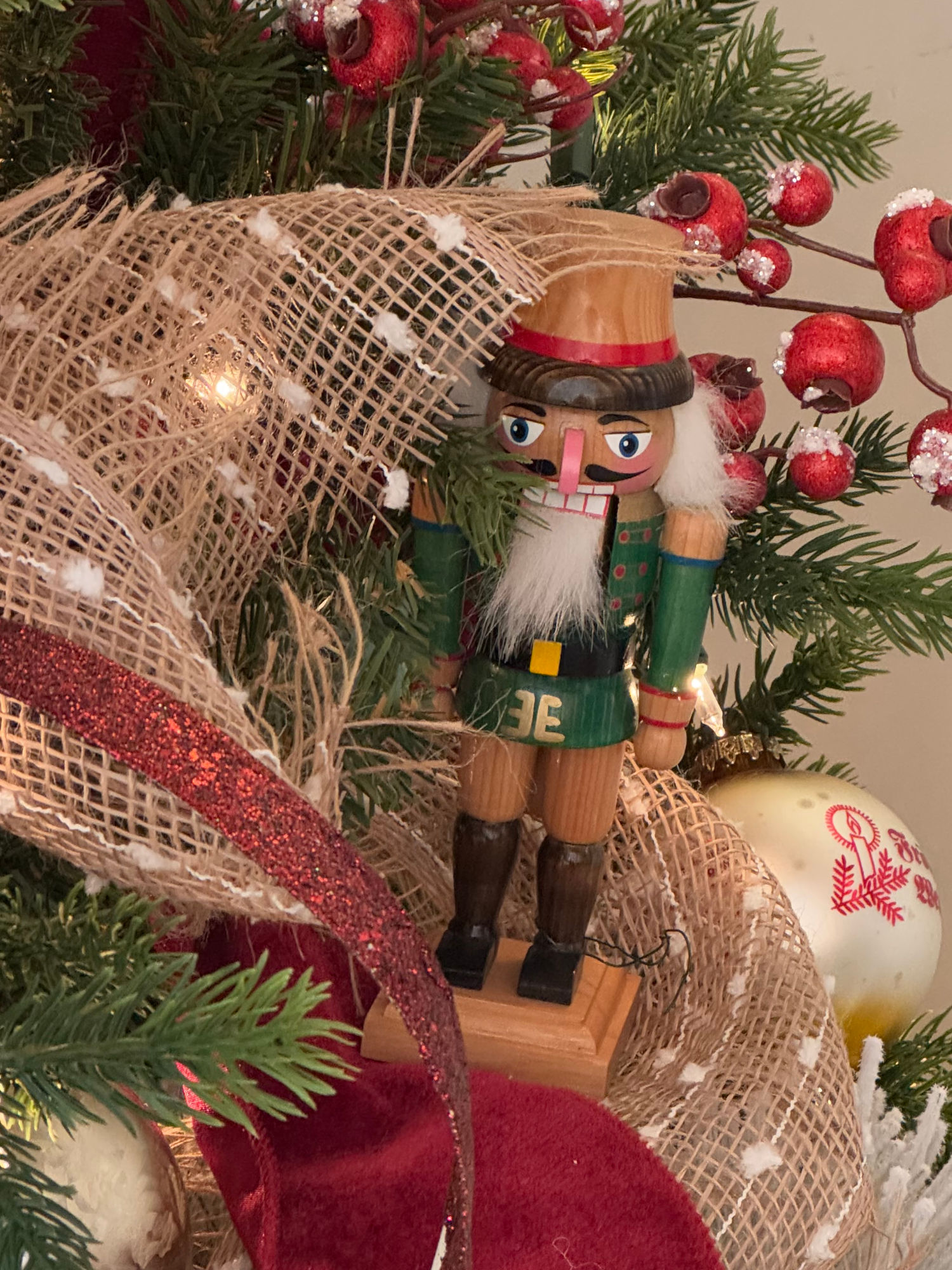



CULTURE TRIPGerman Christmas Traditions
As in many other Christian countries, Christmas is the most special time of the year in Germany. Though the most important ingredients of Christmas across the world are the same – festive cheer, family time and delicious food – each country has its own special way of celebrating this magical festival. These Christmas traditions and rituals are quintessentially German.St Nicholas Day (Sankt Nikolaus Tag)
St Nicholas Day is a favorite holiday with German children. On the night of December 5, children clean and polish their boots and leave them outside the door before going to sleep. Next morning, they find their shoes filled with nuts, candy, and small gifts from St Nicholas. He also makes an appearance in shopping malls and children's clubs. Though Santa Claus has also become popular in Germany, St Nicholas is much more important than his American counterpart. St Nicholas Day is also observed in a few other Western Christian countries, though the mode of celebration varies from country to country.Krampus Night (Krampus Nacht)
Krampus the devil is sort of a sidekick of St Nicholas. He is believed to accompany St Nicholas to teach naughty children a hard lesson. In Southern Bavaria, men in hideous Krampus costumes patrol the streets on St Nicholas Night, and are sometimes invited in by parents of particularly naughty children.Advent Calendar (Adventskalendar)
The Advent calendar is an important countdown to Christmas for German children. Everyday for four weeks preceding Christmas, a window in the advent calendar is opened to reveal a poem, parts of a story, candy or a small gift. Advent calendars flood shops across Germany during this season, while many parents prefer to make their own.Advent Wreath (Adventskranz)
The tradition of Advent wreaths was started by German Lutherans in the 16th century, and today the wreath is still an icon of Christmas in Germany. The wreath consists of four candles in a bed of pine cones, berries, dried flowers and Christmas ornaments. Different families have different traditions when it comes to Adventskranz. Some will bring it out during the first week of December and burn one candle every Sunday in the lead up to Christmas. Others will display the advent wreath on the last Sunday before Christmas and have the entire family sit around it, munching on Christmas delicacies, singing Christmas songs and watching Christmas movies.Epiphany and the Sternsinger
In parts of Germany, Christmas cheer continues until January 6th, which is the day of a religious feast known as Epiphany or Das Dreikonigsfest ('three kings festival'). Often, children dressed as the Magi go from house to house and sing songs (hence the term Sternsinger, or 'star singer') requesting donations towards various children's causes.Christmas Markets (Weihnachtsmarkte)
Granted, the magic of Christmas markets has spread to many other countries and continents, but the origins of Christmas markets can be traced back to the German-speaking part of Europe in the Middle Ages. A few thousand Christmas markets are held all over Germany each year. The next time your heart warms at the sight of twinkling lights adorning the adorable Christmas market in your part of the world, remember that you have the Germans to thank for it.Mulled Wine (Gluhwein)
Christmas season in Germany is not complete without mugs of steaming hot Gluhwein. This quintessential Christmas beverage is sold in ceramic mugs in all Christmas markets in Germany and is considered vital in beating the winter chill and spreading festive cheer.Feuerzangenbowle
The Feuerzangenbowle is an immensely potent German Christmas beverage that is as much a feast for the taste buds as for the eyes. Rum with a high alcohol level is added generously to mulled wine, and the concoction is set in flames. On that note, to spend a Christmas Eve like a German, watch the cult movie Die Feuerzangenbowle (1944), which traces the hilarious deeds of a middle-aged man under the influence of Feuerzangenbowle.Christmas Angels (Weihnachtsengel)
Christmas angels are the most loved Christmas ornaments in Germany. They are put up on Christmas trees and all around the house at Christmas time. The Christmas angels are most commonly made of wood, and are often seen playing their musical instruments. Expect to see thousands of these in any Christmas market in Germany.Christmas Stollen
Stollen is a traditional German Christmas cake, and it's delicious! It is a cake made of flour, with fruits (chopped, candied, or dried), nuts, and spices added to it. Stollen is sprinkled with powdered sugar and sometimes zest is added to it. Natives of Dresden celebrate a huge festival centering on Christmas stollen.Lebkuchen
Lebkuchen is another special German Christmas treat. This one resembles gingerbread. These baked delights contain honey, a number of spices, and nuts, and can be soft or hard, sweet, or spicy, and with or without icing. Though it is traditionally a Christmas delicacy, Lebkuchen is often sold in fairs, festivals and souvenir shops across Germany. Many of them have messages written on them.
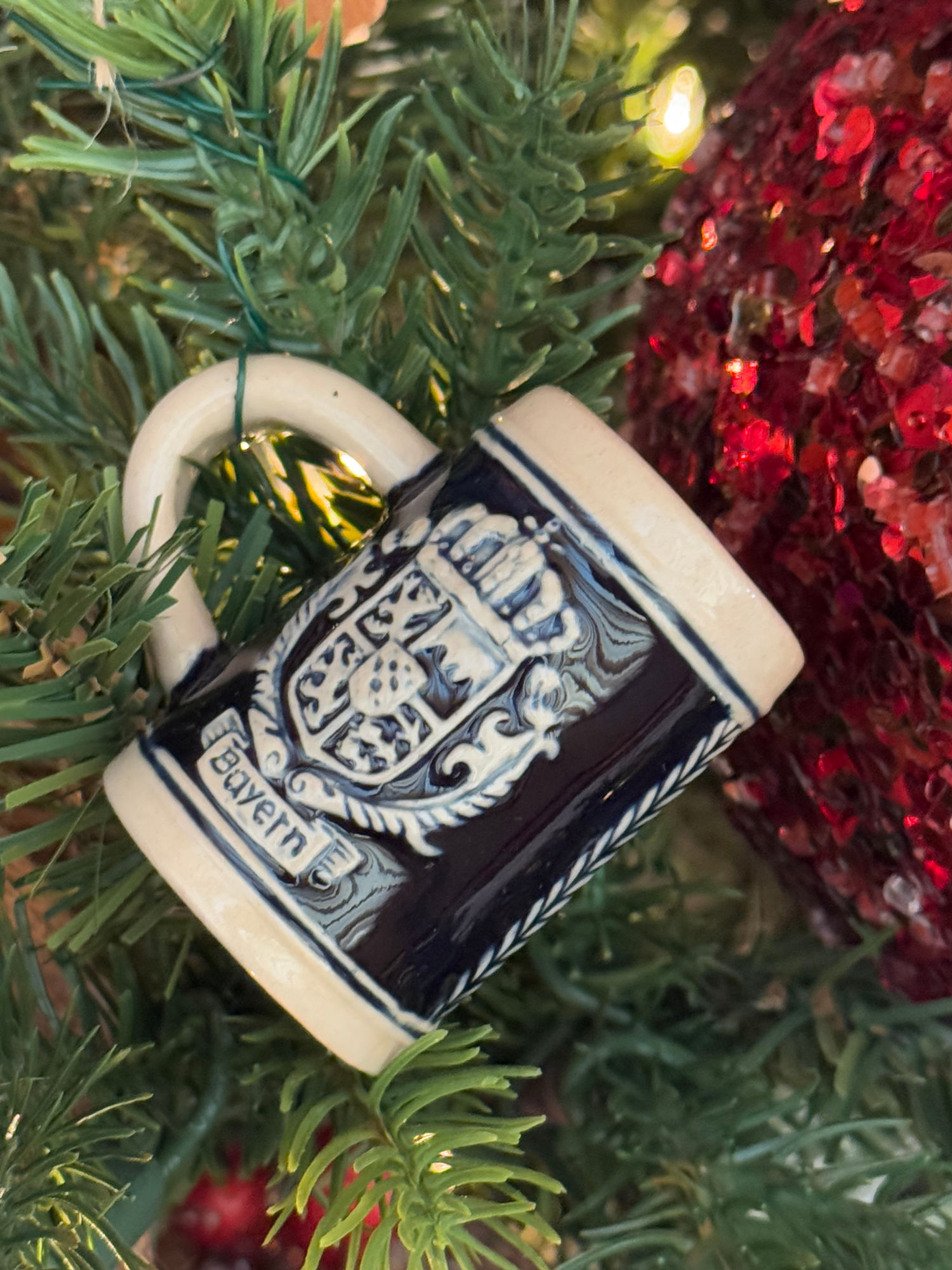
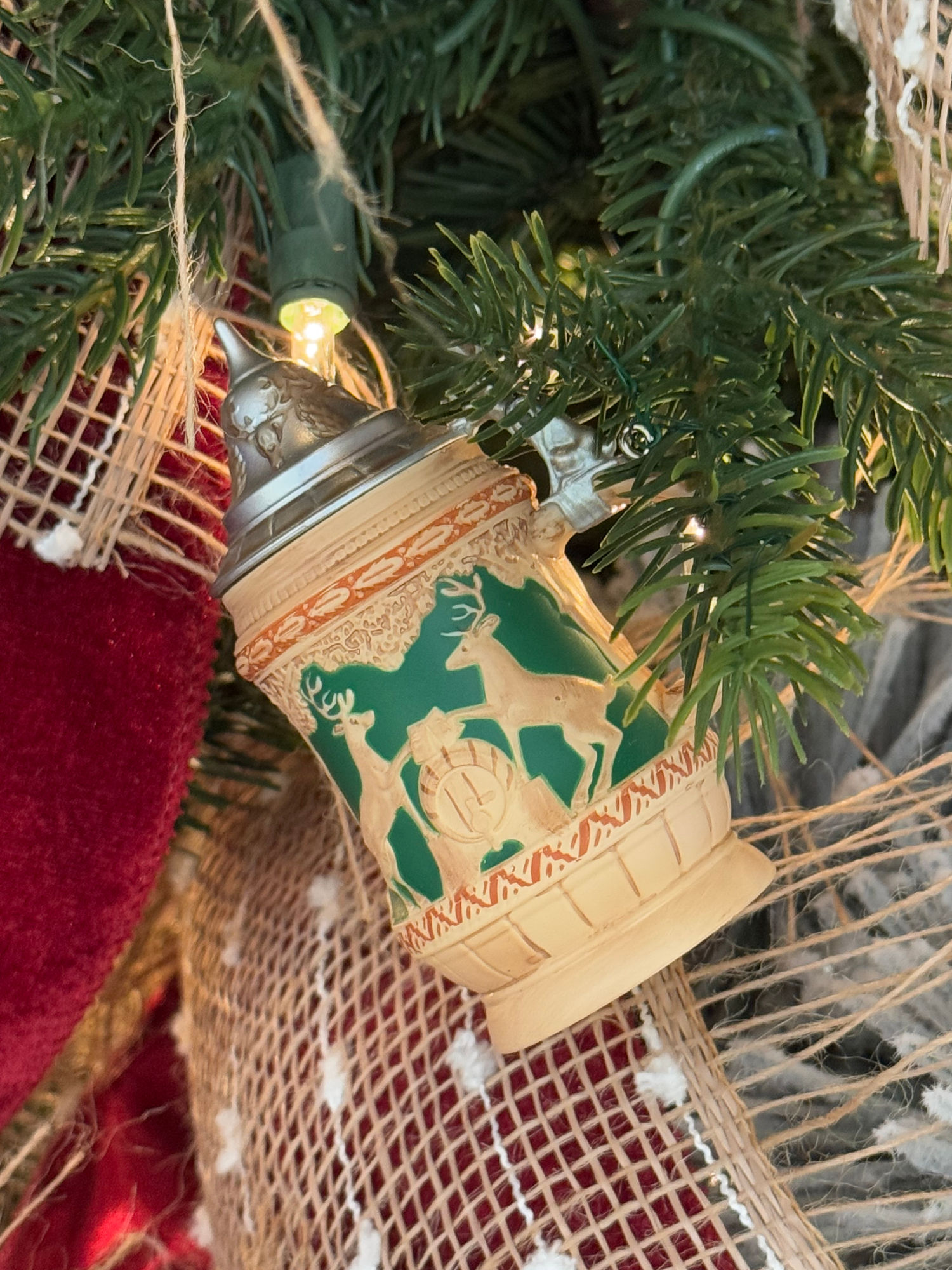
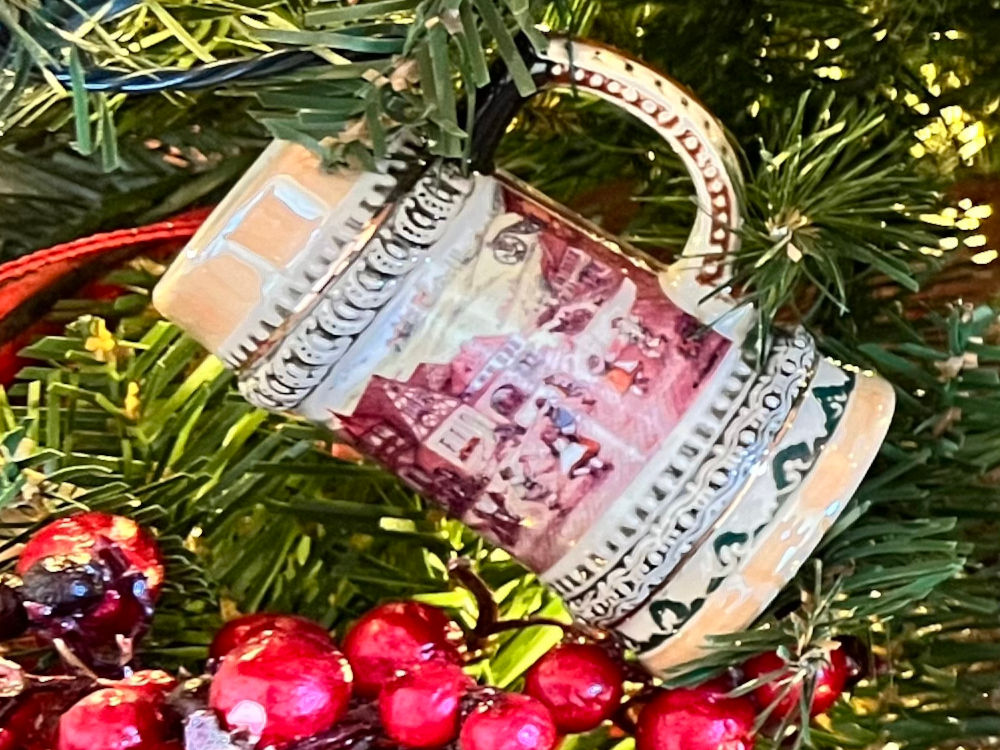
WIKIPEDIAWeihnachten
The observance of what is commonly known in English as Christmas in the German-speaking countries such as Germany, Austria and Switzerland. It is also widespread in countries with a German-speaking minority, such as Transylvania in Romania, South Tyrol in Italy, Eupen in Belgium, and various diasporas such as the German Brazilian and German American communities. Traditions of Weihnachten influenced Advent and Christmastide culture throughout the world.In preparation for Weihnachten, many families celebrate Advent. This is a time of religious preparation for the arrival of das Christkind (the Christ Child). Traditional advent activities include the Adventskranz (Advent wreath), which is set up on the fourth Sunday before Christmas Day, the beginning of the Advent season. Four candles adorn the wreath, and a new one is lit each Sunday. Families often sing Christmas carols as they gather around the wreath to celebrate the preparation and Christmas season.
Children also enjoy the advent calendar, which contains 24 doors, one for each day of December leading up to Christmas. Children open one door each day, and find a chocolate treat awaiting them. Many calendars also include pictures inside the doors, often Christmas-related.
A significant part of the Christmas build-up occurs on 6 December, when it is Nikolaustag, the day commemorating Saint Nicholas. On the evening of 5 December, children in Germany place a Nikolausstiefel (a boot or a shoe) in front of the street door. Overnight, the Nikolaus, a figure similar in appearance to Santa Claus or Father Christmas, visits the house and fills the boots with sweets and sometimes even smaller presents if the children were good; otherwise they are left with only a rute (a cane composed of birch twigs).
During the Christmas period, the Weihnachtsmarkt (Christmas market) becomes a feature of almost every city, town, or village in the German-speaking countries, where visitors enjoy stalls, entertainment, and savour food and Gluhwein (mulled wine). Traditional Christmastime treats include Lebkuchen (gingerbread), Stollen (fruit cake), Speculaas and marzipan (almond confectionery often made into sweets). Perhaps the most famed of these markets is the Christkindlesmarkt held in Nuremberg, which attracts millions of visitors every year.
The Weihnachtsbaum (Christmas Tree) is usually put up in the afternoon of 24 December. The trees can be bought at special traders' sites, but some families may still go into the forest and cut one themselves.
Traditionally, on Heiligabend (Christmas Eve) in Germany, a simple meal will be prepared and served before or after the Bescherung ("time for exchanging gifts"), in contrast to the big meal on Christmas Day. Various polls repeatedly declare (Eintopf) or sausages (Wurstchen) with potato salad to be Germany's favorite meal on Heiligabend. Further typical meals may include carp, fondue or raclette. On Christmas Day, the most common dishes are roast goose or duck.
Many families begin the celebration on Heiligabend (literally, Holy Evening, or Christmas Eve) in the afternoon or evening. Although there are two legal holidays in Germany, , most cantons of Switzerland and Liechtenstein for Christmas, Christmas Eve is not one of them, and in Switzerland, many companies and stores are open for a half-day in the morning until 4 p.m, after which celebrations begin.
Many go to church before the celebration begins. Christmas masses/services often last around one hour. Families with children go to a children's mass which is usually shorter and dramatised with a Krippenspiel (nativity play).
The customs held upon returning from church leading to the gift-giving vary across the German-speaking countries. Commonly, the returning children wait to enter into their locked living room until a little bell rings. This bell marks the departure of the one who is delivering gifts. In the more Catholic regions-primarily South Germany and Switzerland-the gift bearer role belongs to the Christkind, while those in North Germany commonly consider it to be the Weihnachtsmann (Saint Nicholas or Santa Claus) who is exiting.
The children then enter to see the decorated Weihnachtsbaum (Christmas tree), with all the presents beneath wrapped in colorful paper that has been prepared by an adult while they were away at church. Adults may also share gifts while the children are opening theirs. For the Bescherung in Germany, the only light comes from the Christmas tree lights (traditionally real candles, though today generally replaced by electric lights). In Switzerland, this is done after the big meal in the evening.
An alternative tradition in many homes does not include a ringing bell or presents already lying beneath the tree when children return from church. Instead (although not in the southern region) the Weihnachtsmann, usually played by a relative, appears in person, knocking at the door while the family sits together. Once he is let in, he puts his sack and rute (shepherd's crook) aside and greets the family. He then asks the child or children to perform by singing a Christmas song or reciting a poem and then asks them if they were naughty or nice. Most children admit that they have not always been nice, so the Weihnachtsmann wants the promise that they do better next year before giving all their presents. He then retreats and the family spends the rest of the evening together, enjoying their gifts and company.
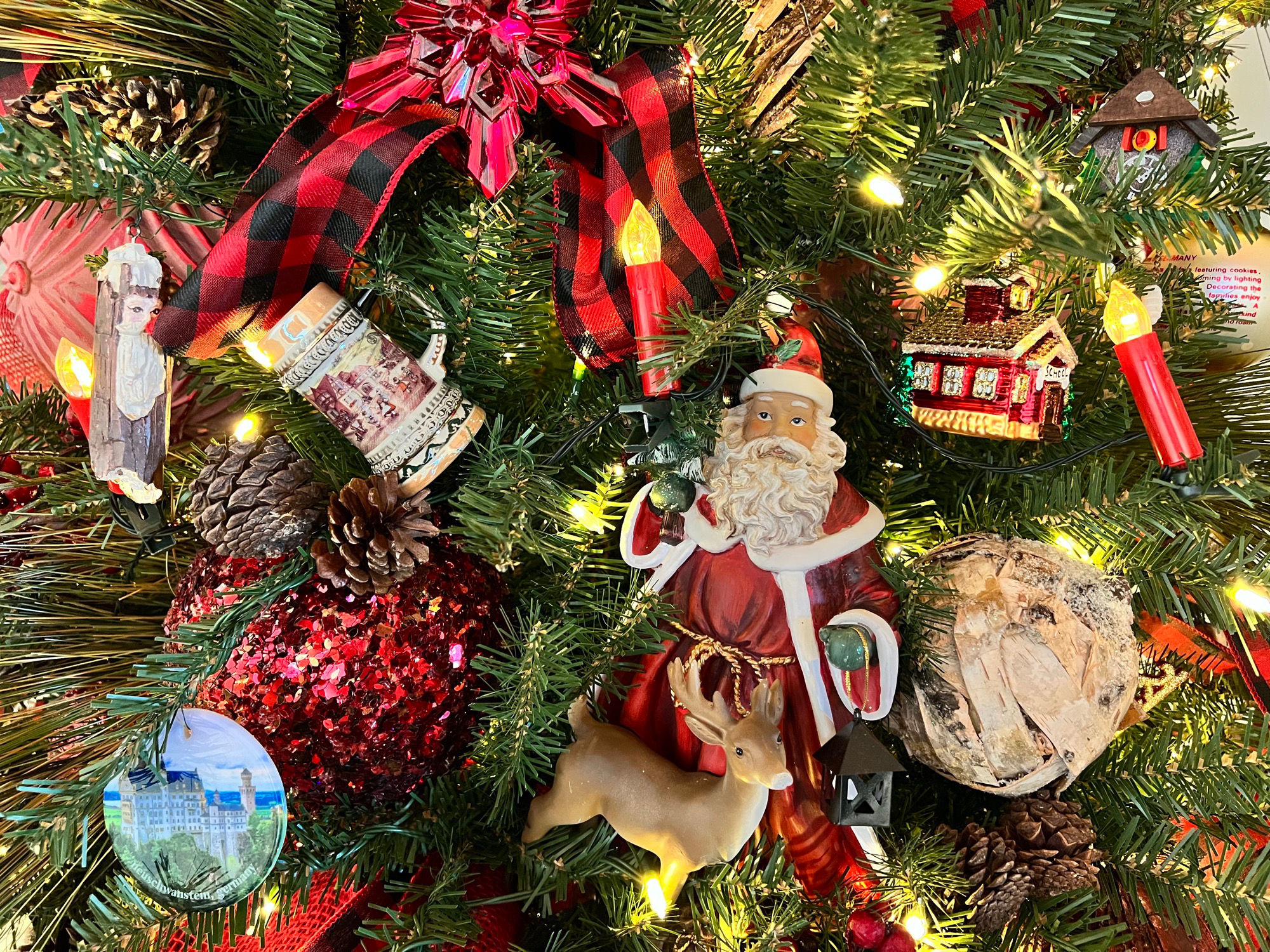
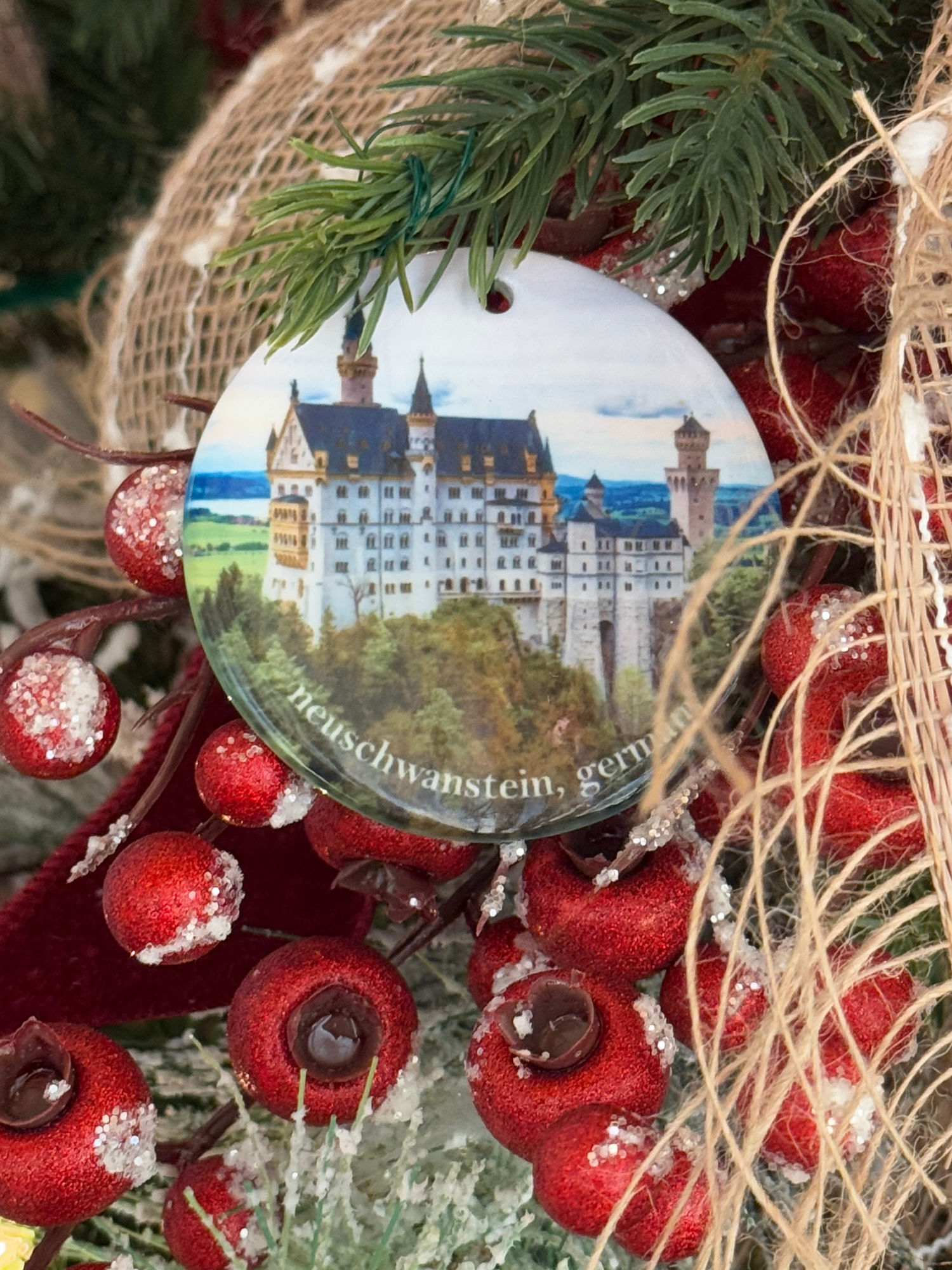
CHEF'S PENCILGerman Christmas Food
While Christmas Eve and the preceding four weeks of Advent are a time of fasting among Christians, it is a time of indulgence in Germany, and many delicious foods and drinks are part of the tradition of celebrating Christmas.Many of the sweet foods you can find listed below are not only eaten during Advent and on Christmas Eve, but also on the 6th of December, which is known as the day of Nikolaus. This tradition is based on Saint Nicholas of Myra, a Christian bishop who had a reputation as a bringer of gifts. The American Santa Claus or Father Christmas in the UK are both based on Saint Nicholas.
However, in Germany there are two celebrations related to him, Christmas on the 24th of December as well as a small celebration earlier in December.
In Germany, children leave a boot outside their house on the evening of the 5th of December to then find it filled with presents the next morning. These presents are often Nikolaus figures made of chocolate, Lebkuchen, oranges, nuts and small toys, which are only a little taster before the big celebration on the 24th.
Gluhwein (Mulled Wine) and Kinderpunsch (Fruit Punch for Children)
Across the country in all regions of Germany you can find Gluhwein (mulled wine), a hot drink of sweetened red wine, spiced with cinnamon, cloves, oranges and star anise.
- If you like your Christmas drink to be spectacular (and hard to pronounce) why not try some Feuerzangenbowle? In some areas of Germany, you can get this type of Gluhwein, served with a sugar cone soaked in highly alcoholic rum on top of the mug using a contraption called Feuerzange (German for fire tongs), which is set on fire, making the sugary hot rum drip slowly into the mug.
Lebkuchen (Cake / Cookie)
The perfect accompaniment to a mug of Gluhwein is a plate full of sweet Lebkuchen. Often sweetened with honey, this cake or cookie tastes similar to gingerbread and comes in various different shapes and flavors: round and glazed with chocolate or sugar icing, heart shaped and filled with apricot jam, star shaped, or rectangular and decorated with almonds, just like the most traditional Lebkuchen from Nuremberg, called Elisenlebkuchen.Gebrannte Mandeln (Candied Almonds)
Another Christmas market favorite, Gebrannte Mandeln (translates to burnt almonds) are candied almonds, which are made fresh in large pans and taste best when they are still warm and crunchy.Stollen (Fruit Bread)
Another classic sweet delicacy is the Christstollen or Weihnachtsstollen. This cake-like fruit bread is full of marzipan, nuts, raisins or other candied fruit, and covered with a thick layer of icing sugar, making it look like it is covered in snow. The most traditional Stollen can be found in the eastern German city of Dresden, where it was first mentioned in historic records back in 1474.Weihnachtskarpfen (Christmas Carp)
The time of Advent is actually a time of abstinence and fast (the Nativity Fast) in the Eastern Orthodox and Catholic Church. Hence, on Christmas Eve the 40 days of fasting are not over yet and, in some regions, this means that the main dish of the evening is fish, as no meat is allowed. The Christmas fish of choice is carp, the Weihnachtskarpfen, often coated with breadcrumbs and fried, served with cold potato or cucumber salad, or boiled potatoes and lemon.Kartoffelsalat (Potato Salad) und Wurstchen (Sausages)
Similar to the Christmas carp is the tradition of serving cold Kartoffelsalat (potato salad made with a vinegar or mayonnaise dressing) and Wurstchen (usually boiled Vienna sausages) on Christmas Eve. This dish is supposed to symbolize a modest meal for the end of the fasting time, and to remember Mary and Joseph living in poverty before Jesus' birth.Schweinebraten (Pork Roast)
After the modest meal of potato salad and sausages or carp on Christmas Eve, many families celebrate the end of the Nativity Fast on the 25th of December with a large feast. Traditionally, farmers would raise and fatten a pig especially for this day of celebration and then make a pork roast after slaughtering it. This Schweinebraten (pork roast) is often served on Christmas Day, the 25th, with potatoes, dumplings or sauerkraut.Weihnachtsgans (Christmas Goose)
Legend has it that in the Middle Ages some people didn't deem serving Christmas carp to be festive enough and claimed that geese could also be regarded as fish, due to their affinity to water. This very generous interpretation of what foods are allowed during fasting led to the Weihnachtsgans (Christmas goose) becoming a popular meal for Christmas Eve. It is often served with cabbage and dumplings.Weihnachtsente (Christmas Duck)
Another popular indulgent Christmas centerpiece is a delicious roasted duck. Often the roast duck will be served with an orange or cherry gravy and dumplings. Many families alternate and have goose one Christmas and duck the Christmas after.Rotkohl (Cooked Red Cabbage)
Probably one of the most popular side dishes to any of the aforementioned roasted meats is Rotkohl (cooked red cabbage), as well as Apfelrotkohl (when apple is added).Grunkohl (Green Cabbage / Kale)
People from the north of Germany would probably disagree that Rotkohl is the most popular side dish, as here another cabbage is served at Christmas. Grunkohl (which translates to green cabbage in German and is in fact kale in English) is cooked with animal fat (goose or pork fat) and sometimes bacon pieces and mustard. Even some Christmas markets serve Grunkohl-to-go as a snack with sausage or potatoes.Knodel (Dumplings)
Some families do not simply serve boiled or roasted potatoes with their meal, but potato dumplings (Kartoffelknodel), or bread dumplings (Semmelknodel) or even the more intricate version Serviettenknodel, which are dumplings that are not round balls, but wrapped and boiled in a cotton napkin, also known as a serviette, and then cut in slices.Neunerlei (Nine Dishes)
If you find yourself in the situation where you can't choose what dish to have for Christmas, you should follow the tradition of the region around the Ore mountains along the Czech Republic-German border.Here families eat Neunerlei for Christmas, meaning in fact nine dishes are served, and each dish will bring something good for the coming year: sausages (to bring power and warmth), sauerkraut (to make sure no one will be sour, meaning angry in German), lentils (to keep the "small" money, meaning coins), dumplings and herring or carp (to keep the "big" money, meaning larger amounts of money/bank notes), goose or pork (to bring luck), fruit compote (to bring joy), milk or buttermilk (to keep healthy), nuts or almonds (to make every day successful) and mushrooms or beetroot (to bring joy, luck and health or a good harvest).
Fondue
In recent decades a more modern dish has become a popular choice for Christmas Eve in Germany: Fondue.
- Another modern Christmas tradition in Germany similar to Fondue is having a large Raclette dinner together. Many families own a special electric grill for this occasion, which is placed in the middle of the table, and each family member or dinner guest has their own little pan in which they melt slices of thick-cut cheese. The melted cheese is then poured over a number of different accompanying side dishes, such as boiled potatoes, gherkins, pickled onions, and various cold or dried meats, such as salami or dried ham.
Platzchen (Cookies)
These sweet little biscuits or cookies, usually homemade, are integral to the whole Christmas period in Germany and make for a great dessert after a large meal. Christmas Platzchen first appeared in the 19th century and were used to decorate the Christmas tree. Nowadays many families bake them together at home and then wrap up a selection of different ones in little bags to give to friends as a small present.
- A special type of Platzchen are Zimtsterne (cinnamon stars). Originally from the southwest of Germany, these are made with a dough rich in ground almonds, cinnamon, egg white, sugar and only a little bit of flour. The dough is cut out into stars and covered with a glaze of egg white and sugar, so it looks like the stars are covered in snow and giving them a crispy top.
- Another special type of Platzchen are Vanillekipferl. These crescent-shaped small cookies are originally from Vienna but integral to any mix of Christmas cookies in Germany.
Dominosteine (Chocolates)
Dominosteine (which translates to domino tile) were invented in Dresden in 1936 to replace more expensive chocolate pralines. Even though they were designed to overcome food shortages during World War II, this sweet treat consists of several delicious layers and is still very popular today.


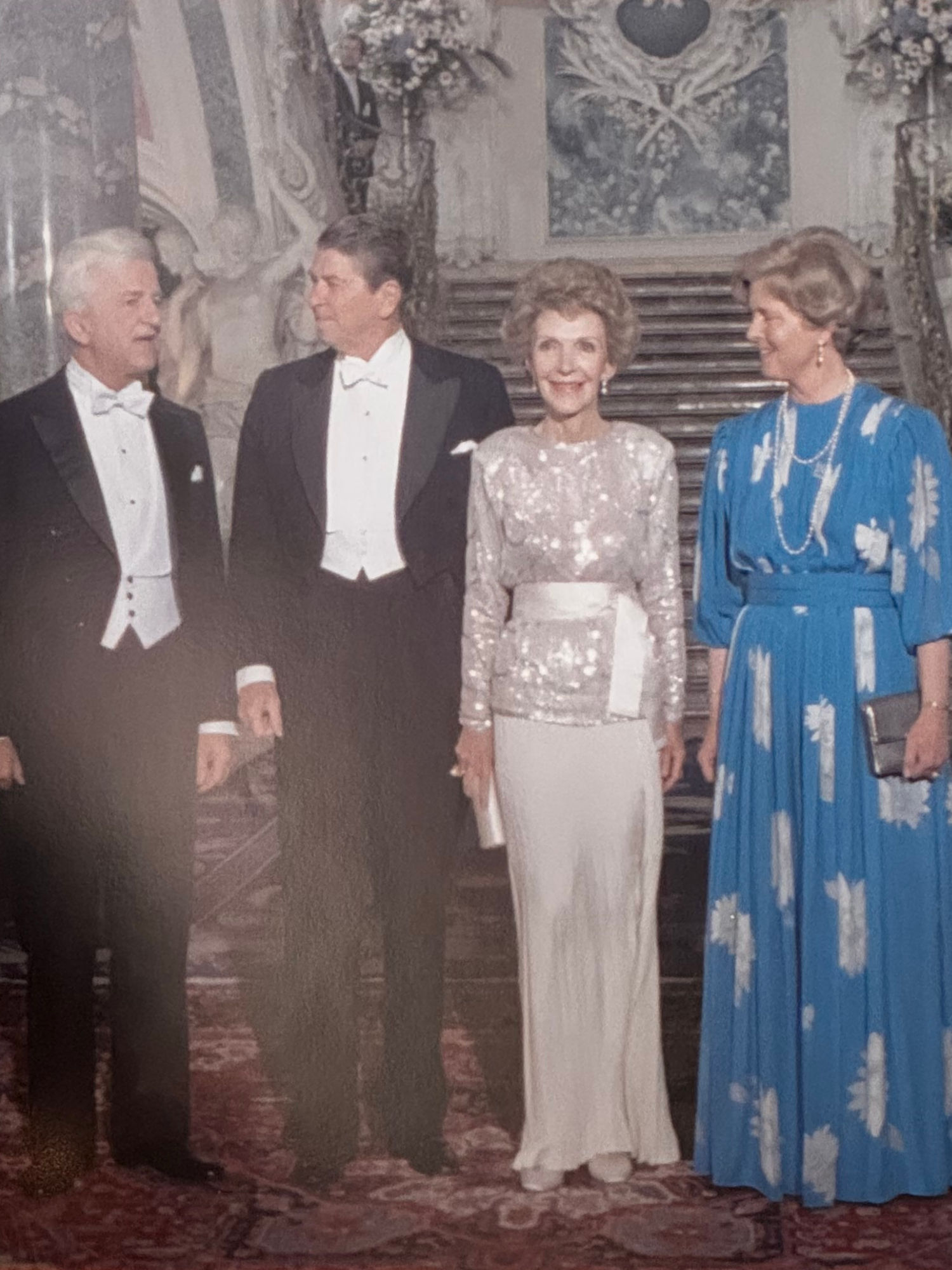
Three times during his presidency, President Reagan visited West Germany where they say, Frohe Weihnachten!

President Reagan and Nancy Reagan departure after remarks at Berlin Wall Brandenburg Gate.
Reagan's Daily DiaryFriday, June 12, 1987
Juice & Coffee at 7:30 A.M.-At 9:20 began saying goodbyes to people at hotel etc. At 9:25 we were in the Admirals barge on our way to the Italian Naval station & by 9:40 we were in a helicopter bound for Marco Polo Airport. On way we circled the Am. vessel which had provided the navy craft & crews for our Venice stay. The sailors were all lined up on deck & I spoke our thanks by radio which they all heard on loud speaker.At the airport we were met by the Fanfanis, the Rabbs, and several others. There was the usual ceremony-Nat. Anthems, reviewing the troops then goodbyes & aboard A.F.1. We had a brunch and arrived at Tempelhof Central Airport in West Berlin at 11:45 A.M. Met by Ambas. Rich Burt & Gahl as well as a considerable group of W.G. officials. A ceremony there-Nat. Anthem & review of troops-American. From there to the Berlin home of Pres. & Mrs. Von Weizsaecker accompanied by Mayor & Mrs. Diepgen. A lot of press photos then a pleasant half hour or so indoors. At 1 P.M. we drove to the Reichstag-the Kohls joined us. We viewed the "Wall" from a balcony. We saw the exhibit of the Marshal plan & Germanys rebuilding. Met several elderly ladies who had been part of the female force that cleaned bricks from the rubble & played a role in Berlins rebuilding. Then it was on to the Brandenburg gate where I addressed tens & tens of thousands of people-stretching as far as I could see. I got a tremendous reception-interrupted 28 times by cheers.
Then it was back to the airport and on our way to Bonn except at airport we viewed displays of Berlin Airlift. Met 3 of pilots of that airlift, one the father of my Mil. Aide Major Steve Chealander.
Finally inside building several thousand people-mainly Am. mil. & familys etc. Again well received in a speech tailored for that audience. A birthday celebration with cake for Berlins 750th anniversary. And then we flew to Bonn with Kohls & Burts on board. Left for Bonn about 4:45 P.M.-The Nat. Anthems-review of troops. There were meetings & photos with various people in Bonn Airport bldg. Then a bi-lateral with Kohl & finally back out for farewell statements to largely American crowd and back to A.F.1.
Departed 7:45 P.M. for Andrews A.F. Base 8 1⁄2 hours away. I was surprised that we traveled in bright sunshine for almost 8 of the 8 1⁄2 hour flight. It didn’t get dark until a little less than an hour out and yet it was after 3 A.M. back where we left. Well home at last.
Key Facts
- President Reagan travels to the Brandenburg Gate of the Berlin Wall in Germany and challenges the Soviet Union by saying, "Mr. Gorbachev, open this gate. Mr. Gorbachev, tear down this wall!"
- President Reagan returns to the White House from the trip to Europe and the 13th G7 Summit.
Ronald ReaganRemarks on East-West Relations at the Brandenburg Gate in West BerlinJune 12, 1987
Thank you very much. Chancellor Kohl, Governing Mayor Diepgen, ladies and gentlemen: Twenty four years ago, President John F. Kennedy visited Berlin, speaking to the people of this city and the world at the city hall. Well, since then two other presidents have come, each in his turn, to Berlin. And today I, myself, make my second visit to your city.
We come to Berlin, we American Presidents, because it's our duty to speak, in this place, of freedom. But I must confess, we're drawn here by other things as well: by the feeling of history in this city, more than 500 years older than our own nation; by the beauty of the Grunewald and the Tiergarten; most of all, by your courage and determination. Perhaps the composer, Paul Lincke, understood something about American Presidents. You see, like so many Presidents before me, I come here today because wherever I go, whatever I do: "Ich hab noch einen koffer in Berlin." [I still have a suitcase in Berlin.]
Our gathering today is being broadcast throughout Western Europe and North America. I understand that it is being seen and heard as well in the East. To those listening throughout Eastern Europe, I extend my warmest greetings and the good will of the American people. To those listening in East Berlin, a special word: Although I cannot be with you, I address my remarks to you just as surely as to those standing here before me. For I join you, as I join your fellow countrymen in the West, in this firm, this unalterable belief: Es gibt nur ein Berlin. [There is only one Berlin.]
Behind me stands a wall that encircles the free sectors of this city, part of a vast system of barriers that divides the entire continent of Europe. From the Baltic, south, those barriers cut across Germany in a gash of barbed wire, concrete, dog runs, and guardtowers. Farther south, there may be no visible, no obvious wall. But there remain armed guards and checkpoints all the same--still a restriction on the right to travel, still an instrument to impose upon ordinary men and women the will of a totalitarian state. Yet it is here in Berlin where the wall emerges most clearly; here, cutting across your city, where the news photo and the television screen have imprinted this brutal division of a continent upon the mind of the world. Standing before the Brandenburg Gate, every man is a German, separated from his fellow men. Every man is a Berliner, forced to look upon a scar.
President von Weizsacker has said: "The German question is open as long as the Brandenburg Gate is closed." Today I say: As long as this gate is closed, as long as this scar of a wall is permitted to stand, it is not the German question alone that remains open, but the question of freedom for all mankind. Yet I do not come here to lament. For I find in Berlin a message of hope, even in the shadow of this wall, a message of (Pg. 635) triumph.
In this season of spring in 1945, the people of Berlin emerged from their air raid shelters to find devastation. Thousands of miles away, the people of the United States reached out to help. And in 1947 Secretary of State--as you've been told-George Marshall announced the creation of what would become known as the Marshall plan. Speaking precisely 40 years ago this month, he said: "Our policy is directed not against any country or doctrine, but against hunger, poverty, desperation, and chaos."
In the Reichstag a few moments ago, I saw a display commemorating this 40th anniversary of the Marshall plan. I was struck by the sign on a burnt-out, gutted structure that was being rebuilt. I understand that Berliners of my own generation can remember seeing signs like it dotted throughout the Western sectors of the city. The sign read simply: "The Marshall plan is helping here to strengthen the free world." A strong, free world in the West, that dream became real. Japan rose from ruin to become an economic giant. Italy, France, Belgium--virtually every nation in Western Europe saw political and economic rebirth; the European Community was founded.
In West Germany and here in Berlin, there took place an economic miracle, the Wirtschaftswunder. Adenauer, Erhard, Reuter, and other leaders understood the practical importance of liberty--that just as truth can flourish only when the journalist is given freedom of speech, so prosperity can come about only when the farmer and businessman enjoy economic freedom. The German leaders reduced tariffs, expanded free trade, lowered taxes. From 1950 to 1960 alone, the standard of living in West Germany and Berlin doubled.
Where four decades ago there was rubble, today in West Berlin there is the greatest industrial output of any city in Germany-busy office blocks, fine homes and apartments, proud avenues, and the spreading lawns of park land. Where a city's culture seemed to have been destroyed, today there are two great universities, orchestras and an opera, countless theaters, and museums. Where there was want, today there's abundance--food, clothing, automobiles-the wonderful goods of the Ku'damm. From devastation, from utter ruin, you Berliners have, in freedom, rebuilt a city that once again ranks as one of the greatest on Earth. The Soviets may have had other plans. But, my friends, there were a few things the Soviets didn't count on Berliner herz, Berliner humor, ja, und Berliner schnauze. [Berliner heart, Berliner humor, yes, and a Berliner schnauze.] [Laughter]
In the 1950's, Khrushchev predicted: "We will bury you." But in the West today, we see a free world that has achieved a level of prosperity and well-being unprecedented in all human history. In the Communist world, we see failure, technological backwardness, declining standards of health, even want of the most basic kind-too little food. Even today, the Soviet Union still cannot feed itself. After these four decades, then, there stands before the entire world one great and inescapable conclusion: Freedom leads to prosperity. Freedom replaces the ancient hatreds among the nations with comity and peace. Freedom is the victor.
And now the Soviets themselves may, in a limited way, be coming to understand the importance of freedom. We hear much from Moscow about a new policy of reform and openness. Some political prisoners have been released. Certain foreign news broadcasts are no longer being jammed. Some economic enterprises have been permitted to operate with greater freedom from state control. Are these the beginnings of profound changes in the Soviet state? Or are they token gestures, intended to raise false hopes in the West, or to strengthen the Soviet system without changing it? We welcome change and openness; for we believe that freedom and security go together, that the advance of human liberty can only strengthen the cause of world peace.
There is one sign the Soviets can make that would be unmistakable, that would advance dramatically the cause of freedom and peace. General Secretary Gorbachev, if you seek peace, if you seek prosperity for the Soviet Union and Eastern Europe, if you seek liberalization: Come here to this gate! Mr. Gorbachev, open this gate! Mr. Gorbachev, tear down this wall!
I understand the fear of war and the pain (Pg. 636) of division that afflict this continent--and I pledge to you my country's efforts to help overcome these burdens. To be sure, we in the West must resist Soviet expansion. So we must maintain defenses of unassailable strength. Yet we seek peace; so we must strive to reduce arms on both sides. Beginning 10 years ago, the Soviets challenged the Western alliance with a grave new threat, hundreds of new and more deadly SS-20 nuclear missiles, capable of-striking every capital in Europe. The Western alliance responded by committing itself to a counterdeployment unless the Soviets agreed to negotiate a better solution; namely, the elimination of such weapons on both sides. For many months, the Soviets refused to bargain in earnestness. As the alliance, in turn, prepared to go forward with its counterdeployment, there were difficult days--days of protests like those during my 1982 visit to this city--and the Soviets later walked away from the table.
But through it all, the alliance held firm. And I invite those who protested then--I invite those who protest today--to mark this fact: Because we remained strong, the Soviets came back to the table. And because we remained strong, today we have within reach the possibility, not merely of limiting the growth of arms, but of eliminating, for the first time, an entire class of nuclear weapons from the face of the Earth. As I speak, NATO ministers are meeting in Iceland to review the progress of our proposals for eliminating these weapons. At the talks in Geneva, we have also proposed deep cuts in strategic offensive weapons. And the Western allies have likewise made far-reaching proposals to reduce the danger of conventional war and to place a total ban on chemical weapons.
While we pursue these arms reductions, I pledge to you that we will maintain the capacity to deter Soviet aggression at any level at which it might occur. And in cooperation with many of our allies, the United States is pursuing the Strategic Defense Initiative-research to base deterrence not on the threat of offensive retaliation, but on defenses that truly defend; on systems, in short, that will not target populations, but shield them. By these means we seek to increase the safety of Europe and all the world. But we must remember a crucial fact: East and West do not mistrust each other because we are armed; we are armed because we mistrust each other. And our differences are not about weapons but about liberty. When President Kennedy spoke at the City Hall those 24 years ago, freedom was encircled, Berlin was under siege. And today, despite all the pressures upon this city, Berlin stands secure in its liberty. And freedom itself is transforming the globe.
In the Philippines, in South and Central America, democracy has been given a rebirth. Throughout the Pacific, free markets are working miracle after miracle of economic growth. In the industrialized nations, a technological revolution is taking place--a revolution marked by rapid, dramatic advances in computers and telecommunications.
In Europe, only one nation and those it controls refuse to join the community of freedom. Yet in this age of redoubled economic growth, of information and innovation, the Soviet Union faces a choice: It must make fundamental changes, or it will become obsolete. Today thus represents a moment of hope. We in the West stand ready to cooperate with the East to promote true openness, to break down barriers that separate people, to create a safer, freer world.
And surely there is no better place than Berlin, the meeting place of East and West, to make a start. Free people of Berlin: Today, as in the past, the United States stands for the strict observance and full implementation of all parts of the Four Power Agreement of 1971. Let us use this occasion, the 750th anniversary of this city, to usher in a new era, to seek a still fuller, richer life for the Berlin of the future. Together, let us maintain and develop the ties between the Federal Republic and the Western sectors of Berlin, which is permitted by the 1971 agreement.
And I invite Mr. Gorbachev: Let us work to bring the Eastern and Western parts of the city closer together, so that all the inhabitants of all Berlin can enjoy the benefits that come with life in one of the great cities of the world. To open Berlin still further to (Pg. 637) all Europe, East and West, let us expand the vital air access to this city, finding ways of making commercial air service to Berlin more convenient, more comfortable, and more economical. We look to the day when West Berlin can become one of the chief aviation hubs in all central Europe.
With our French and British partners, the United States is prepared to help bring international meetings to Berlin. It would be only fitting for Berlin to serve as the site of United Nations meetings, or world conferences on human rights and arms control or other issues that call for international cooperation. There is no better way to establish hope for the future than to enlighten young minds, and we would be honored to sponsor summer youth exchanges, cultural events, and other programs for young Berliners from the East. Our French and British friends, I'm certain, will do the same. And it's my hope that an authority can be found in East Berlin to sponsor visits from young people of the Western sectors.
One final proposal, one close to my heart: Sport represents a source of enjoyment and ennoblement, and you many have noted that the Republic of Korea--South Korea-has offered to permit certain events of the 1988 Olympics to take place in the North. International sports competitions of all kinds could take place in both parts of this city. And what better way to demonstrate to the world the openness of this city than to offer in some future year to hold the Olympic games here in Berlin, East and West?
In these four decades, as I have said, you Berliners have built a great city. You've done so in spite of threats--the Soviet attempts to impose the East-mark, the blockade. Today the city thrives in spite of the challenges implicit in the very presence of this wall. What keeps you here? Certainly there's a great deal to be said for your fortitude, for your defiant courage. But I believe there's something deeper, something that involves Berlin's whole look and feel and way of life--not mere sentiment. No one could live long in Berlin without being completely disabused of illusions. Something instead, that has seen the difficulties of life in Berlin but chose to accept them, that continues to build this good and proud city in contrast to a surrounding totalitarian presence that refuses to release human energies or aspirations. Something that speaks with a powerful voice of affirmation, that says yes to this city, yes to the future, yes to freedom. In a word, I would submit that what keeps you in Berlin is love--love both profound and abiding.
Perhaps this gets to the root of the matter, to the most fundamental distinction of all between East and West. The totalitarian world produces backwardness because it does such violence to the spirit, thwarting the human impulse to create, to enjoy, to worship. The totalitarian world finds even symbols of love and of worship an affront. Years ago, before the East Germans began rebuilding their churches, they erected a secular structure: the television tower at Alexander Platz. Virtually ever since, the authorities have been working to correct what they view as the tower's one major flaw, treating the glass sphere at the top with paints and chemicals of every kind. Yet even today when the Sun strikes that sphere--that sphere that towers over all Berlin--the light makes the sign of the cross. There in Berlin, like the city itself, symbols of love, symbols of worship, cannot be suppressed.
As I looked out a moment ago from the Reichstag, that embodiment of German unity, I noticed words crudely spray-painted upon the wall, perhaps by a young Berliner, "This wall will fall. Beliefs become reality." Yes, across Europe, this wall will fall. For it cannot withstand faith; it cannot withstand truth. The wall cannot withstand freedom.
And I would like, before I close, to say one word. I have read, and I have been questioned since I've been here about certain demonstrations against my coming. And I would like to say just one thing, and to those who demonstrate so. I wonder if they have ever asked themselves that if they should have the kind of government they apparently seek, no one would ever be able to do what they're doing again. Thank you and God bless you all.
NOTEThe President spoke at 2:20 p.m. at the Brandenburg Gate. In his opening remarks (Pg. 638) , he referred to West German Chancellor Helmut Kohl. Prior to his remarks, President Reagan met with West German President Richard von Weizsacker and the Governing Mayor of West Berlin Eberhard Diepgen at Schloss Bellevue, President Weizsacker's official residence in West Berlin. Following the meeting, President Reagan went to the Reichstag, where he viewed the Berlin Wall from the East Balcony.
WIKIPEDIAThe Federal Republic of Germany
A country in the western region of Central Europe. It is the second-most populous country in Europe after Russia, and the most populous member state of the European Union. Germany is situated between the Baltic and North seas to the north, and the Alps to the south. Its 16 constituent states are bordered by Denmark to the north, Poland and the Czech Republic to the east, Austria and Switzerland to the south, and France, Luxembourg, Belgium, and the Netherlands to the west. The nation's capital and most populous city is Berlin and its main financial center is Frankfurt; the largest urban area is the Ruhr.Various Germanic tribes have inhabited the northern parts of modern Germany since classical antiquity. A region named Germania was documented before AD 100. In 962, the Kingdom of Germany formed the bulk of the Holy Roman Empire. During the 16th century, northern German regions became the center of the Protestant Reformation. Following the Napoleonic Wars and the dissolution of the Holy Roman Empire in 1806, the German Confederation was formed in 1815.
Formal unification of Germany into the modern nation-state was commenced on 18 August 1866 with the North German Confederation Treaty establishing the Prussia-led North German Confederation later transformed in 1871 into the German Empire. After World War I and the German Revolution of 1918–1919, the Empire was in turn transformed into the semi-presidential Weimar Republic. The Nazi seizure of power in 1933 led to the establishment of a totalitarian dictatorship, World War II, and the Holocaust. After the end of World War II in Europe and a period of Allied occupation, in 1949, Germany as a whole was organized into two separate polities with limited sovereignty: the Federal Republic of Germany, generally known as West Germany, and the German Democratic Republic, known as East Germany, while Berlin continued its de jure Four Power status. The Federal Republic of Germany was a founding member of the European Economic Community and the European Union, while the German Democratic Republic was a communist Eastern Bloc state and member of the Warsaw Pact. After the fall of communist led-government in East Germany, German reunification saw the former East German states join the Federal Republic of Germany on 3 October 1990.
Germany has been described as a great power with a strong economy; it has the largest economy in Europe, the world's third-largest economy by nominal GDP and the fifth-largest by PPP. As a global power in industrial, scientific and technological sectors, it is both the world's third-largest exporter and importer. As a developed country it offers social security, a universal health care system and a tuition-free university education. Germany is a member of the United Nations, European Union, NATO, Council of Europe, G7, G20, and OECD. It has the third-greatest number of UNESCO World Heritage Sites.
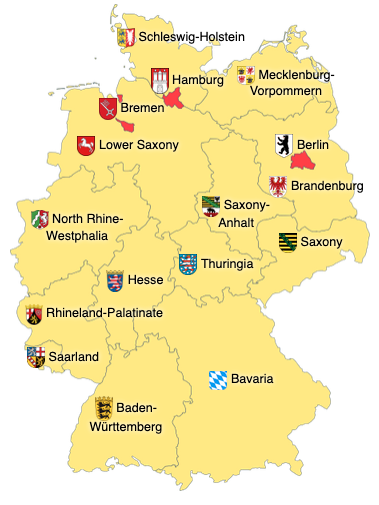
- Germany is a federation and comprises sixteen constituent states which are collectively referred to as Lander. Each state (Land) has its own constitution, and is largely autonomous in regard to its internal organisation. As of 2017 Germany is divided into 401 districts (Kreise) at a municipal level; these consist of 294 rural districts and 107 urban districts.
- More than 400 zoos and animal parks operate in Germany. The Berlin Zoo, which opened in 1844, is the oldest in Germany, and claims the most comprehensive collection of species in the world.
- Germany's military, the Bundeswehr (Federal Defence), is organised into the Heer (Army and special forces KSK), Marine (Navy), Luftwaffe (Air Force), Zentraler Sanitatsdienst der Bundeswehr (Joint Medical Service), Streitkraftebasis (Joint Support Service) and Cyber-und Informationsraum (Cyber and Information Domain Service) branches. In absolute terms, German military expenditure is the eighth-highest in the world.
- It is the world's third-largest exporter and third-largest importer, and has the largest economy in Europe, which is also the world's fourth-largest economy by nominal GDP, and the fifth-largest by PPP.
- Being home to the modern car, the automotive industry in Germany is regarded as one of the most competitive and innovative in the world, and is the sixth-largest by production as of 2021. Germany is home to Volkswagen Group, the world's second-largest automotive manufacturer in 2022 by both vehicle production and sales, and is the third-largest exporter of cars as of 2023.
- With its central position in Europe, Germany is a transport hub for the continent. Its road network is among the densest in Europe. The motorway (Autobahn) is widely known for having no general federally mandated speed limit for some classes of vehicles. The Intercity Express or ICE train network serves major German cities as well as destinations in neighboring countries with speeds up to 300 km/h (190 mph). The largest German airports are Frankfurt Airport and Munich Airport. The Port of Hamburg is one of the twenty largest container ports in the world.
- In 2019, Germany was the world's seventh-largest consumer of energy. All nuclear power plants were phased out in 2023.
- Germany is the ninth-most visited country in the world as of 2017, with 37.4 million visits. Germany's most visited and popular landmarks include Cologne Cathedral, the Brandenburg Gate, the Reichstag, the Dresden Frauenkirche, Neuschwanstein Castle, Heidelberg Castle, the Wartburg, and Sanssouci Palace. The Europa-Park near Freiburg is Europe's second-most popular theme park resort.
- Germany is the most populous country in the European Union, the second-most populous country in Europe after Russia, and the nineteenth-most populous country in the world, with a population of 80.2 million according to the 2011 German Census, rising to 83.7 million as of 2022. Germany has the third oldest population in the world, with an average age of 47.4 years. The fertility rate of 1.57 children born per woman (2022 estimates) is below the replacement rate of 2.1 and is one of the lowest fertility rates in the world.
- Four sizeable groups of people are referred to as national minorities because their ancestors have lived in their respective regions for centuries: There is a Danish minority in the northernmost state of Schleswig-Holstein; the Sorbs, a Slavic population, are in the Lusatia region of Saxony and Brandenburg; the Roma and Sinti live throughout the country; and the Frisians are concentrated in Schleswig-Holstein's western coast and in the north-western part of Lower Saxony.
- After the United States, Germany is the second-most popular immigration destination in the world. Refugee crises have resulted in substantial population increases. As of 2019, Germany ranks seventh among EU countries in terms of the percentage of migrants in the country's population, at 13.1%.
- Christianity is the largest religion in Germany, with 66.8% of respondents identifying as Christian according to the 2011 census.
- German is the official and predominant spoken language in Germany.
- Most of the German universities are public institutions, and students traditionally study without fee payment. Germany is the world's third leading destination for international study. The established universities in Germany include some of the oldest in the world, with Heidelberg University (established in 1386), Leipzig University (established in 1409) and the University of Rostock (established in 1419) being the oldest. The Humboldt University of Berlin, founded in 1810 by the liberal educational reformer Wilhelm von Humboldt, became the academic model for many Western universities.
- Germany's system of hospitals, called Krankenhauser, dates from medieval times, and today, Germany has the world's oldest universal health care system, dating from Bismarck's social legislation of the 1880s. Germany ranked 21st in the world in 2019 in life expectancy.
- Germany is well known for such folk festival traditions as the Oktoberfest and Christmas customs, which include Advent wreaths, Christmas pageants, Christmas trees, Stollen cakes, and other practices.
- German classical music includes works by some of the world's most well-known composers. Dieterich Buxtehude, Johann Sebastian Bach and Georg Friedrich Handel were influential composers of the Baroque period. Ludwig van Beethoven was a crucial figure in the transition between the Classical and Romantic eras.
- The national alcoholic drink is beer. German beer consumption per person stands at 29 US gallons in 2013 and remains among the highest in the world. German beer purity regulations date back to the 16th century. Wine has become popular in many parts of the country, especially close to German wine regions. In 2019, Germany was the ninth-largest wine producer in the world.
- Football is the most popular sport in Germany. With more than 7 million official members, the German Football Association (Deutscher Fußball-Bund) is the largest single-sport organisation worldwide, and the German top league, the Bundesliga, attracts the second-highest average attendance of all professional sports leagues in the world.
- Germany is one of the leading motor sports countries in the world. Constructors like BMW and Mercedes are prominent manufacturers in motor sport. Porsche has won the 24 Hours of Le Mans race 19 times, and Audi 13 times (as of 2017).
- German athletes historically have been successful contenders in the Olympic Games, ranking third in an all-time Olympic Games medal count when combining East and West German medals prior to German reunification.
EtymologyThe English word Germany derives from the Latin Germania, which came into use after Julius Caesar adopted it for the peoples east of the Rhine. The German term Deutschland, originally diutisciu land (the German lands) is derived from deutsch (cf. Dutch), descended from Old High German diutisc 'of the people' (from diot or diota 'people'), originally used to distinguish the language of the common people from Latin and its Romance descendants.


